Russia failed to respond adequately to politician’s homophobic verbal assault, European Court finds
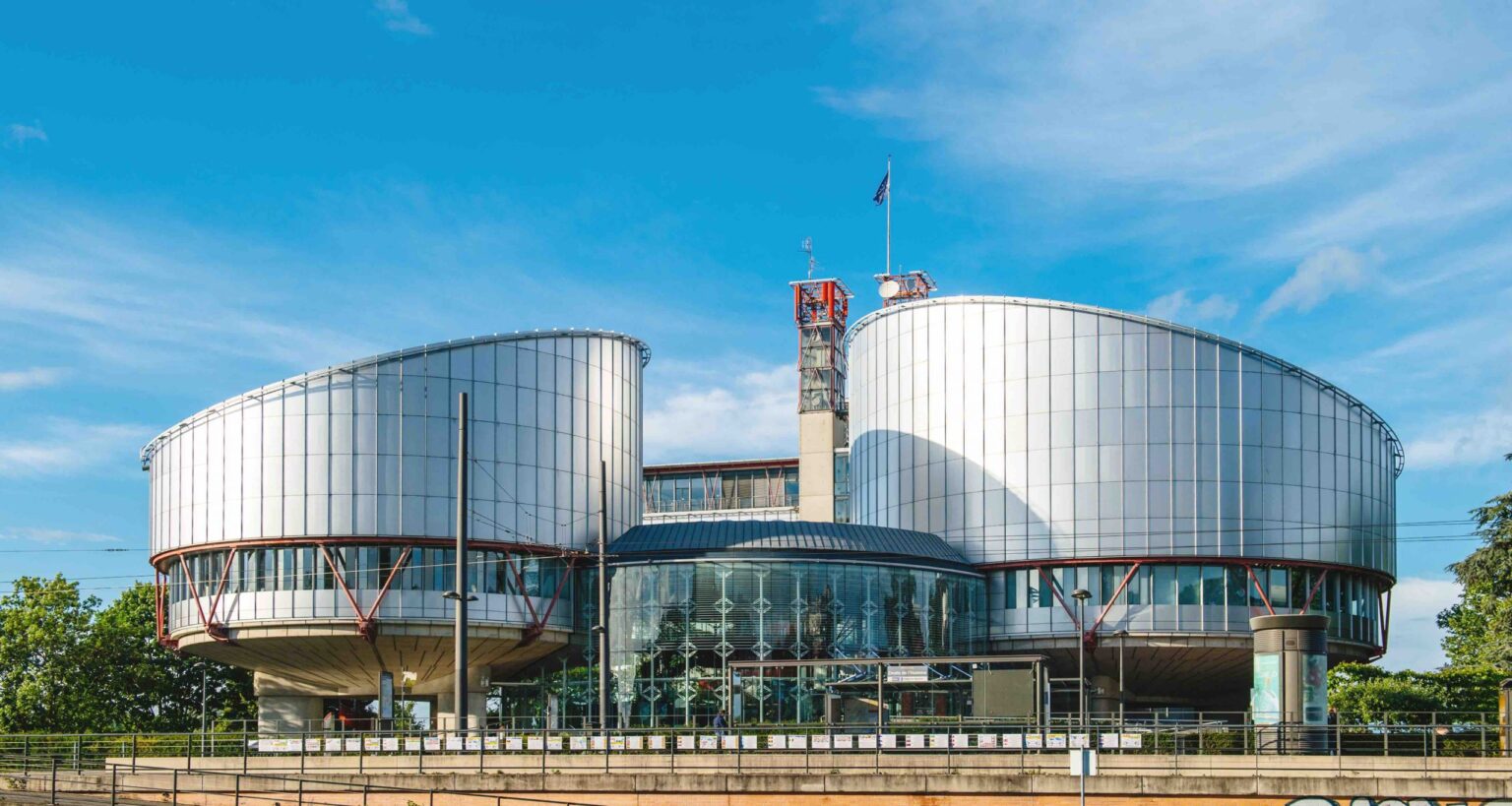
The European Court of Human Rights has found that Russia’s failure to respond adequately to homophobic verbal assault and physical threats by a politician against LGBTI activists is in breach of their human rights.
Last week, in case Yevstifeyev and others v. Russia, lodged by victims of homophobic hate speech in Russia, the European Court of Human Rights found a violation of Article 8 of the European Convention on Human Rights (right to private and family life), together with Article 14 (prohibition of discrimination).
The applicants are LGBTI rights activists who participated as part of the LGBTI column in a rally against hatred in St Petersburg where they had to face homophobic insults and physical threats from a well-known politician and member of the St Petersburg Legislative Assembly, who attended the rally. He also spread false information concerning the applicants.
The applicants lodged criminal complaints but the authorities refused to register them, claiming the politician had allegedly merely expressed his personal opinion about the LGBTI community. The applicants also lodged an administrative offence complaint and a civil complaint, which were dismissed on the grounds that the statements did not amount to insult, as they were not directed against specifically named individuals.
The Court first confirmed that the applicants had been directly targeted by the verbal assault and that the statements at issue affected their psychological well-being and dignity, and therefore fell within the sphere of their private life.
As to the authorities’ refusal to register the criminal complaints, the Court found that the domestic authorities had failed to strike a fair balance between the applicants’ rights to respect for their private life and to be protected from discrimination on the ground of sexual orientation on one hand, and the public interest in protecting freedom of expression on the other hand.
Turning to the administrative complaint, the Court found that the domestic authorities did not provide relevant and sufficient reasons for dismissing the administrative complaints. Lastly, as regards the civil proceedings, the Court ruled that, by finding that the applicants were not affected by the contested statement, the civil courts had failed to acknowledge the applicants’ rights to respect for their private life and to protection from discrimination on the ground of sexual orientation. The Court made clear that, contrary to the civil courts’ rulings, the politician’s statements could not be construed in a neutral way and were openly homophobic, had been particularly aggressive and hostile in tone, and included physical threats against the participants in the rally.
As a result, the Court concluded that the domestic authorities failed to comply with their positive obligation to respond adequately to the verbal assault and physical threats motivated by homophobia directed against the applicants. It recalled its previous ruling that “failure to address such incidents can normalise hostility towards LGBTI individuals, perpetuate a culture of intolerance and discrimination and encourage further acts of a similar nature.” The judgment can be accessed here.
What we can learn from LGBTI activists against all odds
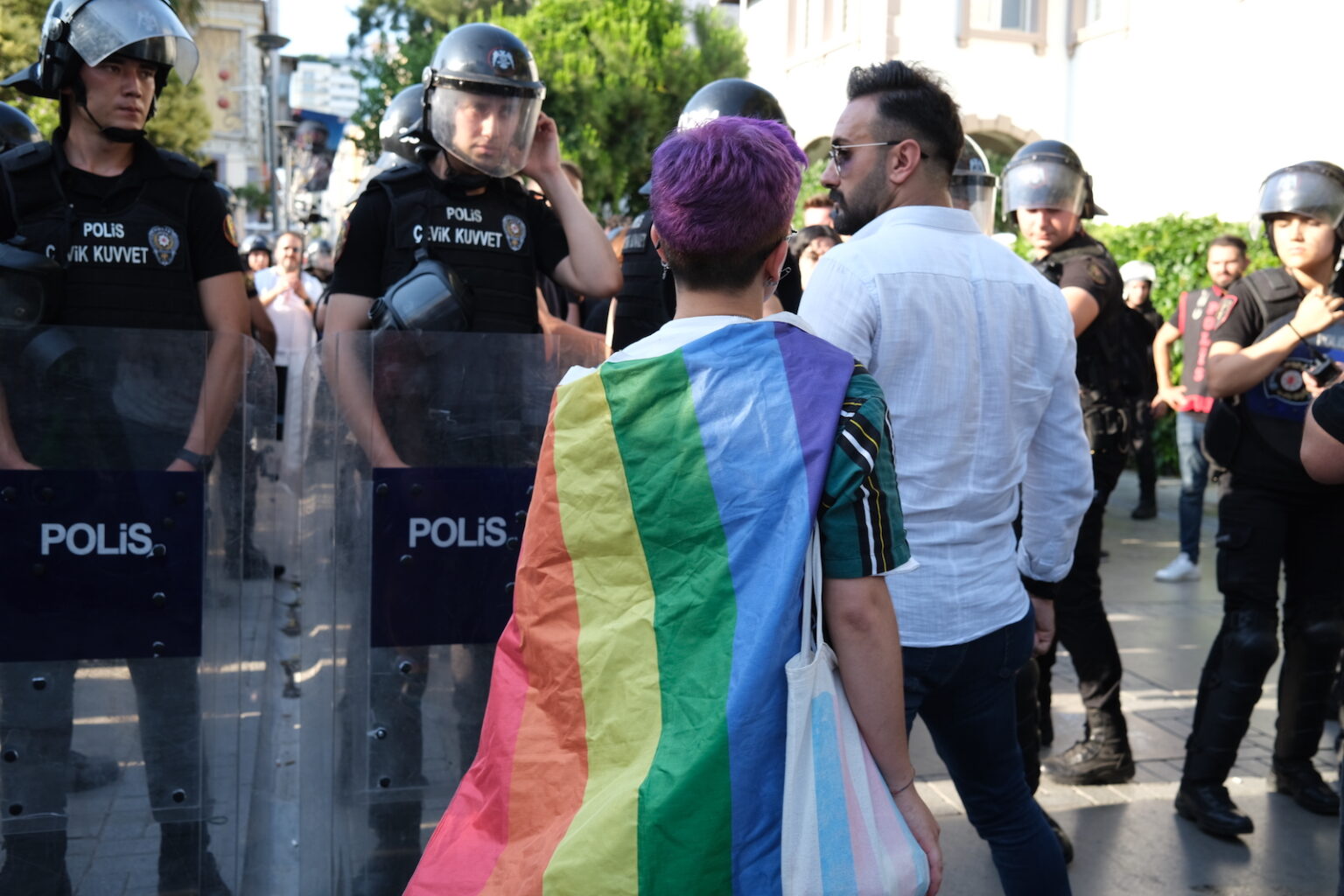
In countries where governments are pushing back on LGBTI people’s rights, joining Pride events is a courageous act that carries higher risks. However, it is in their invisible, everyday work where LGBTI activists showcase their most profound courage. The LGBTI movement in Turkey, as well as in Armenia and Azerbaijan, serve as remarkable examples of resilience against all odds. Keep reading to discover some key insights from our movement and find out more in our podcast.
“Take a moment and imagine yourself in this context,” begins Anastasia Smirnova, ILGA-Europe’s Programmes Director in a recent episode of The Frontline. “For eight years, you’ve been living amidst detentions, smear campaigns, cases against LGBTI activists, and violence that goes unpunished. Extremism and terrorism are terms often associated with the LGBTI movement. You vividly remember last year’s Pride events where hundreds were detained and subjected to police violence.”
This is not a fictional scenario but the daily reality of LGBTI activists in Turkey. Led by recently re-elected President Erdoğan, the Turkish government has intensified systematic attacks on LGBTI people since 2015, when the Istanbul Pride march was banned for the first time.
“So, would you show up at the Pride events in Turkey this year?” asks Anastasia.
“Not an imaginary you – not the bravest and most courageous version of you living in a vacuum. But the real you, with your life circumstances, responsibilities, and current challenges. What would inspire and empower you to show up, ready to face violence and knowing that detentions are possible?”
LGBTI activists in Turkey, and in countries where the government actively opposes LGBTI rights and existence, face potential repercussions, including in their personal lives. But instead of being discouraged by Erdogan’s hostility exhibited during the elections and the previous nine years in office, LGBTI activists in Turkey have organised a record number of Pride events over the spring and summer.
Despite all the risks and knowing that 500 people were detained during Pride season in 2022, they continue to show up.
“It is hard to imagine a stronger and clearer display of strength, solidarity, and resilience than LGBTI people and allies in Turkey taking to the streets, participating in the broader political context, and using their voices despite years of political intimidation,” says Anastasia.
Activism beyond Pride events
They do this not only during Pride season but every day. “For this to be possible, massive invisible work has to happen daily.” This work, unlike Pride events, will not make headlines. Yet, this is the work that enables people to continue showing up and grow their strength in numbers.
Prides and public protests are not the only signs of a strong movement. Referring to the countries at the bottom of our Rainbow Map ranking, where freedom of assembly is severely restricted, “people’s power manifests very differently, and often not on the surface,” explains Anastasia
Examples are offering expertise pro bono, contributing money, helping build connections with businesses, other civil society organisations, the media, among professionals or in educational, cultural, or healthcare spaces.
“It is people doing what they can in their immediate environment to improve the situation of LGBTI people, creating an alternative layer in society that counters state-sponsored anti-LGBTI ideologies,” says Anastasia.
What Turkey, Armenia and Azerbaijan teach us
The three countries at the bottom of the Rainbow Europe scale in 2023 are Azerbaijan, Turkey, and Armenia, the same as the last three years. Yet, the LGBTI movement in these countries offers valuable lessons for all LGBTI groups across the board.
“Over the last 15 years, we’ve seen not only how countries can advance but also how human rights and freedoms are attacked,” says Mehmet Akin, Senior Communications Officer with ILGA-Europe.
When anti-democratic representatives instrumentalise LGBTI people for their own political gain, the freedoms of LGBTI people are gradually taken away. Countries at the top of our ranking are not immune to these anti-democratic forces, who are increasing their presence across the region.
“This is a wake-up call from countries at the bottom of the ranking to those at the top, as LGBTI rights are one of their primary targets,” says Mehmet.
Despite all hardships, LGBTI movements in Russia or Turkey, but also in the EU, as in Poland or Hungary, have developed effective strategies for advocacy, community building, and exercising their freedom of assembly and expression.
“I think activists at the top of our list can learn from the countries at the bottom in terms of the experience they’ve already gained in continuing their work despite legal regression and societal repression,” concludes Mehmet.
Listen to the complete episode and learn more about the strength of the movement against all odds here and to all episodes about our Rainbow Map here.
Photo credits: Murat Kocabaş / Kaos GL
The timeline leading from anti-LGBTI Instagram posts to the “honour killing” of an LGBTI activist in Azerbaijan
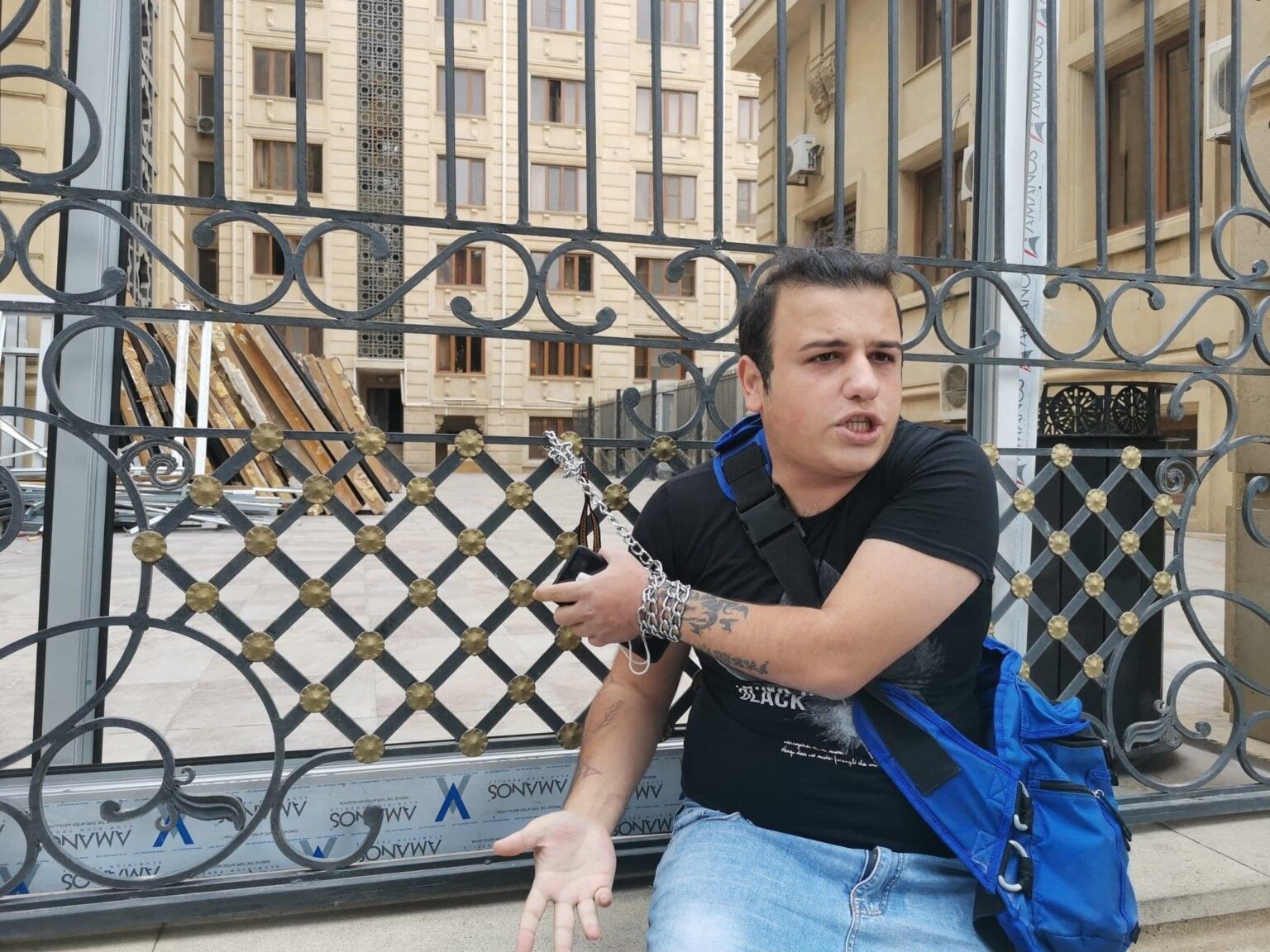
The cousin of LGBTI activist Avaz Hafizli has been jailed for his horrific murder, which came on foot of protests against hateful Instagram posts by the Instagram star, Sevinj Huseynova, who called for the physical ‘removal’ of sexual minorities and trans people from Azerbaijan. The trial was a travesty of justice, according to activists.
On 22 February 2022, the Azeri LGBTQ+ activist and journalist, Avaz Hafizli was brutally murdered by his cousin, 24-year-old Amrulla Gulaliyev. Local LGBTI activists in Azerbaijan believe the murder was motivated by homophobic bias and to protect the “honour” of the family.
The case has been investigated and last month Gulaliyev was sentenced to nine years and six months by Baku Court of Grave Crimes. During the investigation the additional details of the murder were not considered, namely the brutal circumstances of the killing and sexual mutilation of Avaz’ corpse. LGBTI activists were also barred from the court. Gulaliyev was sentenced without any consideration of a biased motive, which would have carried with it double the length of sentence.
ILGA-Europe believe that Azerbaijan failed to fulfil its human rights obligation to prompt, thorough, impartial, and independent investigation to hold responsible person to account for “honour killing” and hate crime as it did not take aggravating circumstances into account when determining sentence.
Avaz’s murder came in the wake of Instagram posts last year by Azerbaijani social media influencer, Sevinj Huseynova, who called for the physical ‘removal’ of sexual minorities and trans people from Azerbaijan in a video that was watched by thousands.
Here is a timeline in the lead-up to Avaz’ murder and the conviction of his cousin, and why it is an example of a stacked system against LGBTI people and the activist movement in Azerbaijan.
July 7, 2021
Azeri Instagram star, Sevinj Huseynova shared a video on her Instagram account in which she humiliated LGBTIs, especially trans women, and encouraged hatred and hostility towards them.
July 9, 2021
A group of trans women made an official appeal to the 17th police station and demanded that Sevinj Huseynova be brought to justice. Despite the appeal, no legal action was taken against Huseynova.
July 16, 2021
Three people were attacked due to their gender in their private house in Khirdalan settlement, Absheron region, and one of them was injured with three stab wounds.
August 13, 2021
Four LGBTI people were attacked in one of the buildings located on Heydar Aliyev Avenue in Khirdalan settlement. One of them was injured.
August 23, 2021
The burned body of Nuray, a trans woman targeted by Sevinj Huseynova, was found by locals in the Buta settlement of Garadagh district.
August 25, 2021
A group of trans women gathered in front of the Garadagh District Police Department and held a protest regarding the murder of the trans woman Nuray. Later, they gathered in front of the Ombudsman’s office and put forward demands. Avaz Hafizli was one of the organisers of the protest. He was vocal in criticising the police for not taking any action against Huseynova, and about the attacks in the wake of Huseynova’s Instagram video.
September 5, 2021
Avaz Hafizli attempted suicide after he was personally threatened and insulted by Sevinj Huseynova.
September 8, 2021
Avaz chained himself to the fences of the Prosecutor General’s, as protest against Huseynova threatening and insulting him and his family. Despite Avaz Hafizli’s official appeal to the prosecutor’s office, no action was taken.
September 10, 2021
Avaz held a one-person rally in the centre of Baku to protest the transphobic and homophobic hate speech by Huseynova. He held up a sign reading “LGBT rights, human rights” and chanted “down with homophobia.” Avaz expressed dissatisfaction with the failure of state agencies to respond to Huseynova’s threatening calls.
February 22, 2022
Avaz was murdered by his cousin, 24-year-old Amrulla Gulaliyev. The murder was conducted in a gruesome fashion, followed by mutilations of Avaz’ body after his death. Gulaliyev was subsequently arrested, and was charged only with the Article 120.1 of Criminal Code – Deliberate murder.
June 20, 2022
The preliminary hearing was held by the judge of Baku Court of Grave Crimes, Ali Mammadov.
July 18, 2022
Having been postponed on July 4, the second hearing was held. Hearings are open to the public, however civil society representatives were not allowed to attend.
Avaz’ brother represented him in the court and said he did not have any complaints against the perpetrator, his cousin. The court then asked Avaz’ mother to represent him. She said she would have to think about it.
There were some contradictions in perpetrator’s statements to police and his testimony in court. He originally told investigators that he had planned the murder three months before the event itself, however during the hearing he denied this. He said that had he and Avaz had been living in the same house for many years, and that only in 2022 did he decide to murder Avaz because of the moral ethics of society.
After repeated requests from LGBTI activists to attend the hearings, only three were allowed with the argument that ‘there are limited places’. However when the activists entered the court room there was sufficient space to have accommodated all the requests of activists to attend.
July 29, 2022
The three activists managed to attend the concluding hearing, at which Amrulla Gulaliyev was sentenced to nine years and six months in prison.
It is unclear to civil society whether the court’s decision will be appealed, as there is no contact with Avaz’ mother, who is his legal representative in this case.
Why this case is important for the Azeri movement and every LGBTI person in Azerbaijan
Over decades of monitoring by local activists, incidents of hate speech and hate crime in Azerbaijan have been numerous and severe. The state has taken no action to tackle homophobia at societal level, while existing legal mechanisms have not been implemented to protect LGBTI people from hate speech or attacks.
But this case shows how both the state and the family as institutions fail LGBTI people. While activists have gained sufficient legal knowledge and formed partnerships to offer legal support, they cannot intervene in cases where the family are both the perpetrators and the legal representatives of the victim at the same time.
The Azeri state’s efforts to silence the truth about this anti-LGBTI honour killing by not allowing the activists to access court hearings also adds to the impunity for such grave acts against this LGBTI people, who remain the most unprotected and vulnerable group in the face of homophobia in Azerbaijan.
How we created our brand-new website to support LGBTI activism

After 18 months of planning and work, the team at ILGA-Europe are proud to introduce our brand-new website. It shows the range of work we do and LGBTI activists and organisations can now easily find the information they need. Keep reading to learn more about how it was developed and how you can make the most of it.
What a journey it’s been! Almost two years ago, ILGA-Europe’s communications team took the first steps towards the renovation of the organisation’s website. The previous version dated from 2015 and so much has happened in the organisation and in the LGBTI movement ever since.
These changes had to be reflected in our digital home. The same way we take care of a house, our website desperately needed a spring cleaning, a rearrangement of the furniture, accessible rooms for all, and brighter colours on the walls. And there were thousands upon thousands of pages, which all had to find their own special place in our new digital house, with a new hierarchy, which made them easily to find.
Working together with SOLOS, a fabulous communication and image agency based in Portugal, we re-imagined the structure and design of our site to streamline the access to information, express in simpler but more dynamic ways the complex work we do, be closer to visitors and make them feel part of the ILGA-Europe community, and to be connected to and useful for our 600-plus membership organisations across Europe and Central Asia, and other LGBTI activists and allies.
Here is what LGBTI activists can find on our new website:
An expanded visual identity
We are happy with ILGA-Europe’s current logo and didn’t want to change it, but we wanted to find a way to extend it beyond the rainbow colours that feature prominently on it, so that our brand-new website would be able to represent the real diversity and intersectionality of our community. The solution the SOLOS design team came up with was to take the coloured dots on what we internally call ‘the tail’ of the ILGA-Europe logo and expand them into a series of animated circles that feature gradients of colours to represent everyone in and every part of our wonderful LGBTI community.
These gradient circles underpin the entire design of the site, and the colours used across its pages. We combined them with a lot of white space so that the website would feel light and accessible instead of dense and off-putting.
Less words, more colour
Remember our old website?
This is how the same page looks in the new website:
Words filled most of the screen in our old pages and while it’s mainly through language that we continue to share what we do and know, alongside resources that may be useful for you, the layout is now less dense and visual elements have more prominence.
Instead of receiving all the information at a first glance, now you can comfortably navigate it by scrolling.
Accessibility for all
A priority throughout the whole process was to make all the website accessible and inclusive for all. The needs of people with visual impairments were at the forefront when testing and selecting fonts, colours and composition. Furthermore, now users can choose the colour schemes and font sizes that work best for them in each and every page.
Finding what you need
The top menu consists of five sections:
- Under About us you will find everything you need to know about our organisation.
- Supporting the movement and Advocacy: These sections compile the work we do, on one hand, empowering LGBTI activists and organisations across Europe and Central Asia and on the other, advocating for the protection of the fundamental rights of LGBTI people in our regions.
- Under Rainbow Europe you will find two of our vital publications on the situation of LGBTI people, the Rainbow Map & Index and the Annual Review.
- Under News you will find our latest publications.
In the “burger menu” (the circle button containing three horizontal lines) you will find the same sections in a dedicated page. There you will find the Donate button too, with which you can support the work we do!
The search function
Internet users have got used to the comfort of typing a word instead of combing section after section to find what they need. That’s why our website now has an optimised search button providing you with useful and meaningful results, which you can filter until you find exactly what you need.
Date, type, topic, tag
You can also navigate our content by date, type, topic or tag. Topics correspond to the areas of our advocacy work and here you will find the content organised by portfolio, while the tags describe what the content is about. There are many more tags than topics. You can combine different options from the date, type, topic and tags lists to target your search.
We hope you enjoy our new website! Here’s an image of a group of SOLOS team members with the ILGA-Europe’s communication’s team after three days of intense work in Brussels in April 2022. We want to thank SOLOS once again for coming along with us in this journey!
Turkey acquits 19 LGBTI+ Pride marchers, honouring fundamental human rights, domestic law, and international commitments
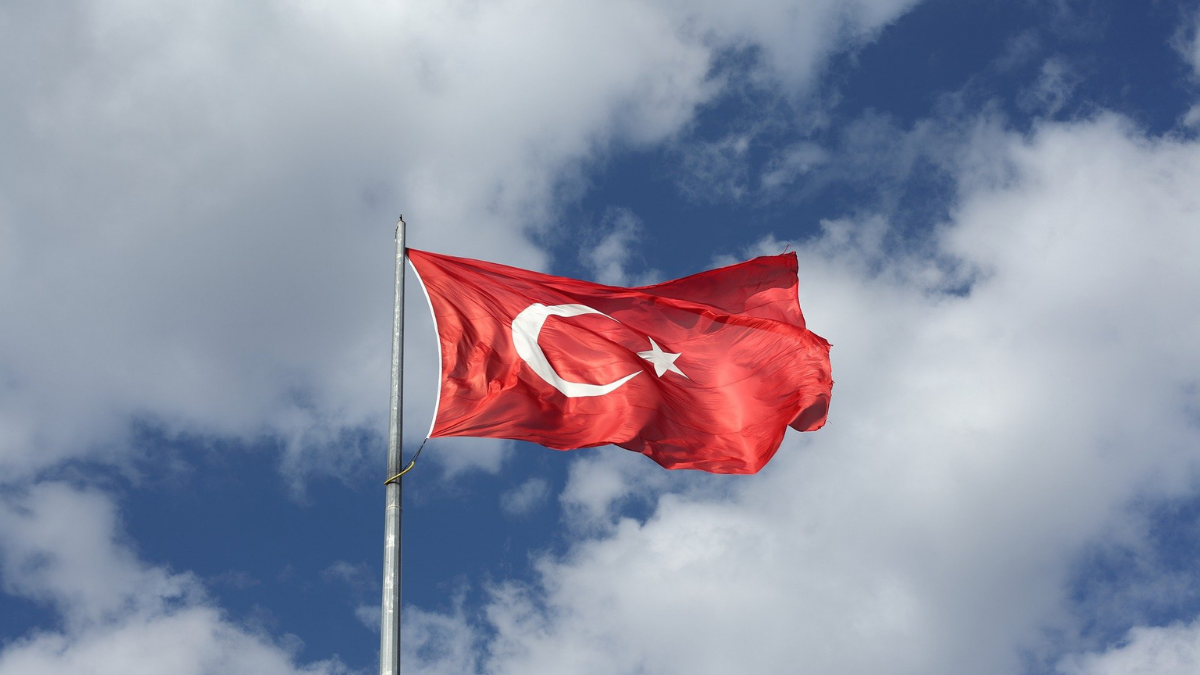
Leading European LGBTI rights organisation, ILGA-Europe welcomes the decision of a Turkish court to acquit 19 activists, who were charged with “unlawful assembly” for their participation in a peaceful LGBTI+ Pride march in 2019.
Today 18 students and one academic who were detained, charged and prosecuted for their participation in a peaceful LGBTI+ Pride march at Turkey’s Middle East Technical University (METU) in the city of Ankara on 10 May 2019 were acquitted, having faced charges of “participating in an unlawful assembly” and “failing to disperse despite being warned” and up to three years in prison.
In 2017, Ankara banned all LGBTI+ activities under a state of emergency, but this ban had been lifted in February 2019. Therefore, there was no legal basis for METU’s administration to ban the march in May 2019. Activists and students exercised their legal right to freedom of assembly, celebrating Pride, however, at the university’s behest, police intervened and used excessive force to disperse the march, detaining 22 participants, of which 19 were charged.
Today the judge at Ankara’s 39th Penal Court of First Instance found the activists not guilty due to the absence of any element of a crime, and confirmed that Pride is not a crime. The official reasoning for his decision will be published in November.
According to Katrin Hugendubel, Advocacy Director at ILGA-Europe: “We are very relieved to hear of the acquittal of the METU Pride LGBTI+ activists. It is very important for LGBTI+ people in Turkey, but also across the region, to see that, in a context of rising hate-speech against LGBTI+ people by political and religious leaders, the courts and judicial processes protect the rights of all people to freedom of assembly, as enshrined in Turkish law and the European Convention on Human Rights, to which Turkey is party, and thus uphold the rule of law.”
According to Özgür Gür, from the Turkish NGO, ÜniKuir, who was one of the activists facing judgement in the trial: “We would like to point out that from the very beginning, there should have been no trial at all, and now, with this precedent, we will continue to raise the LGBTI+ struggle. We thank everyone for their support.”
Further information:
Read our joint statement with 8 international human rights organisations in English and Turkish here.
For further comment, contact: Ana Muñoz Padrós, ILGA-Europe: ana@ilga-europe.org, +32 493 35 60 55
Why online resource sharing is the way forward for the LGBTI movement
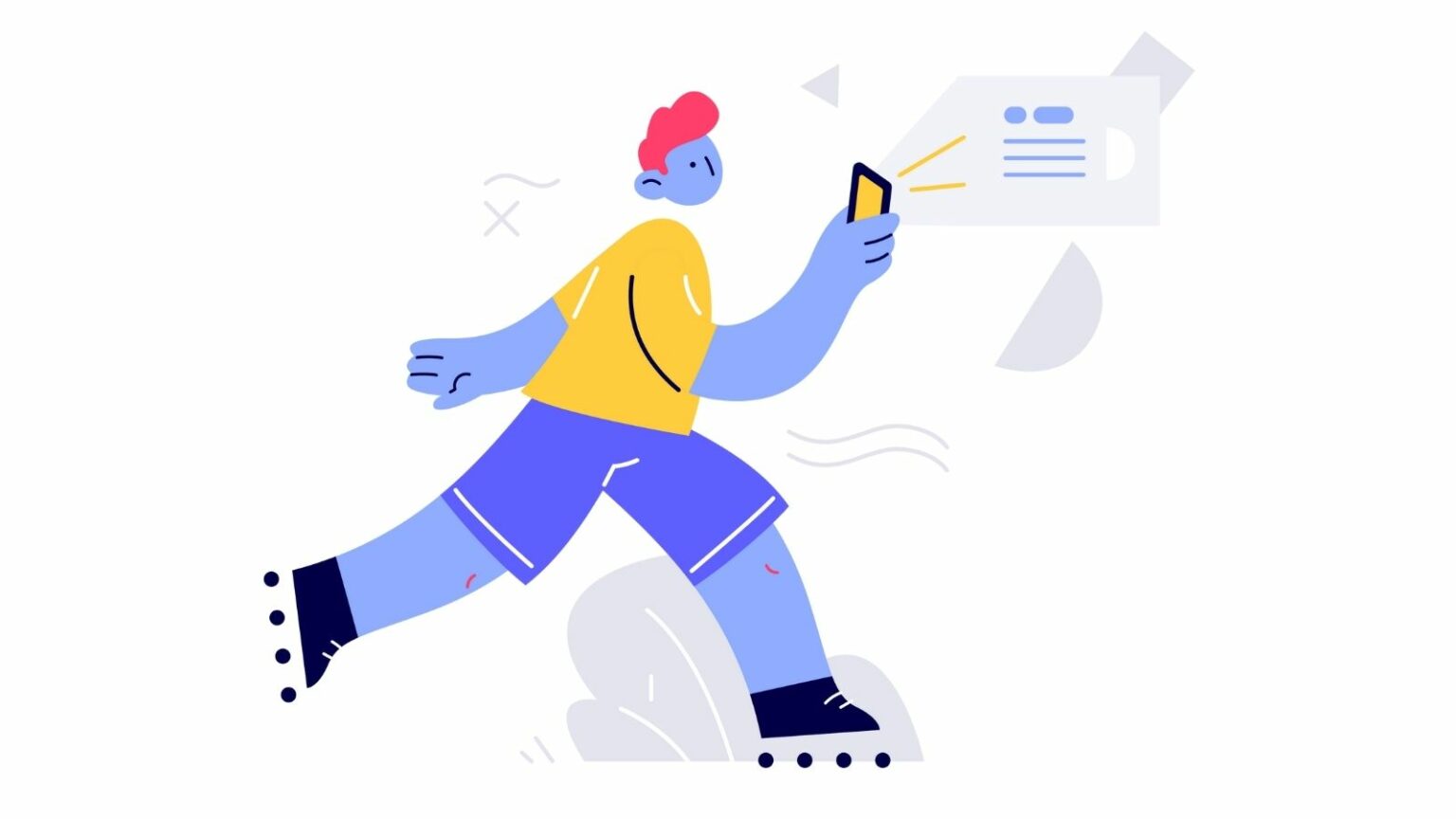
2020 proved to be a game-changer for LGBTI activists, sending almost every aspect of the work into the digital sphere. Luckily ILGA-Europe had been developing an online resource-sharing centre for a few years before COVID-19 hit, and we probably couldn’t have picked a better moment to launch it.
Imagine the year is 2019. Like so many other activists in the international human rights movement, so much of your work seems to depend on travelling and attending in-person events. At the same time, it’s impossible to keep up to speed with the things you need to know to do your work successfully. It’s hard to think of other ways to get informed, and the work just seems to grow and grow, leaving very space and time to focus on the work you need to do. Prior to 2020, we at ILGA-Europe had been asking ourselves how we could better meet the needs of activists in these changing times.
Then COVID-19 came along and everything changed. Suddenly all travel was off the table, our workspaces went online, along with the meetings we needed to attend. The internet became our primary tool to keep in touch with each other. For ILGA-Europe, it was no longer the question whether online tools could support the cross-border solidarity that has characterised our LGBTI movement for many decades. The question became about how online tools might do this in the best possible way.
At ILGA-Europe we have been quietly working on the creation of an online resource-sharing tool for a few years now. This week we proudly launched the result of that work, our online resource sharing centre, The Hub. We probably couldn’t have chosen a better moment to launch it. After a year of seeing all international LGBTI convenings cancelled or reconfigured online, there is an urgent question of how we can best go about sharing information.
A go-to place for activists
Webinars and other online gatherings have done great service to the movement, but they aren’t resources that stay put. We wanted to create one go-to place where activists can search for diverse resources. A place where we can easily add new resources as they become available. We call these resources ‘cards’, and new cards will be added to The Hub every month.
In offering learning opportunities to the movement, we increasingly see that activists have very specific questions. For instance, activists don’t ask how they should carry out communications generally, but they may have questions about how to produce a podcast, or create a campaign. They don’t ask how to fundraise but want to know how to make online fundraising events work, or raise donations via Facebook. Cards on The Hub address such specific questions and do so in a super easily-accessible way.
The Hub currently offers content in eight thematic sections — areas of work that are clear priorities for the LGBTI movement in Europe and Central Asia: Campaigning, Communications, Community, Fundraising, Management, Security, Wellbeing — and Russian translated cards. We will be adding other thematic sections later on.
Another important reason for us to build The Hub was to make sure that resources become available for all activists, and not just the lucky ones who attend our conferences or other events. That’s why The Hub is accessible to any LGBTI activist.
Use your own experience to benefit the movement
We wanted to build an online resource centre where over time activists can contribute with their own experiences, adding them to the resources we’ve created at ILGA-Europe. So we added an easy-to-use feature called ‘Case Studies’, which allows activists to add their own experience to cards. So, for instance, if you have created a podcast, you can add the things you have learned to the card. Or if you hosted an online fundraising event, you can tell other activists about the learning you’ve achieved. Case studies capture the work and experiences of activists and thus allow activists to directly learn from each other.
Will this mean the end of ILGA-Europe’s in-person events?
The short answer is no. We understand that The Hub cannot replace in-person meetings and conferences, and we will continue to organise them post-COVID. Networking, critical conversations, trust-building ̶̶ these are some of the things that cannot be easily done online. We believe that there will continue to be a space for such events as vaccinations change the face of COVID-19, and we move beyond 2021.
But like our conferences and in-person trainings, The Hub opens the doors for our ILGA-Europe family to grow. It invites in people who normally don’t get to attend events. It allows the ILGA-Europe team to share resources that otherwise wouldn’t be widely disseminated, and allows activists to share their own experiences. It is a timely new addition to ILGA-Europe’s toolbox, with which we hope to continue supporting the strengthening of LGBTI activism across Europe and Central Asia.
Safety first
We are well aware that the internet isn’t always a safe place. Therefore, The Hub has built-in an additional layer of security for sensitive content. Such content is only accessible for users that have been verified by us. When you join The Hub and come across content marked ‘sensitive’, you will be asked to go through a verification process with a member of our team. This allows us to share resources that are specific to the LGBTI community, and for our use only.
If you haven’t joined The Hub yet, now is your chance. Click here and within minutes, you’ll have your profile set up and you’ll be ready to go. Tell other LGBTI activists about it too on your social media, that way our Hub community can continue to grow and strengthen!
Here’s a tweet you can share now!
How LGBTI activists can make terrific home-made videos

Guest blogger, Richard Roaf, director of VideoRev and an expert in helping activists develop low-budget viral campaign videos, shares his best tips for LGBTI activists filming home-made campaign videos and the learnings from the ‘Skills Boost’ workshop he conducted for ILGA-Europe.
Video is one of the most powerful ways LGBTI activists can reach new audiences. People are most persuaded by hearing from individual people, not faceless organisations, and with a presenter video you can share your campaign and your story with people around the world.
I’ve seen how video can shine a light on injustices to millions, drive thousands to take online actions and even help build powerful international movements.
The great news is that these days, if you’ve got a laptop or a smartphone you’ve got everything you need to be a great filmmaker.
This blog will take you through the six production steps and two creative steps you need to make a great video, as we did with the activists who joined in ILGA-Europe’s video-making Skills Boost sessions.
Production: 6 Steps to Filming a High Quality Video
Just picking up your phone and filming something is the best way to learn. Audiences will be moved by your passion and the important information you are sharing, so don’t get hung up on getting the lighting perfect. Having said that, here are six tips:
1. Choose your style
There’s no one right way to film a video. Decide whether you want to come across as formal and professional, or if you want to seem more personal and authentic.
2. Choose your camera and position
You may want to film on your smartphone, laptop, a webcam or a video camera. For a professional shot, make sure the camera is fixed and at eye level. For a more personal shot, film in a selfie style.
3. Backdrop
Arrange your background so it will reflect your campaign and how you want to come across. Use books and professional equipment to emphasise expertise, or use photos, art and colours to bring out more personality.
4. Improve your light
You want lots of even light on your face with minimal shadows. You can achieve this by adding desktop lamps, positioning yourself by a window and if you have budget buying a video light.
5. Sound
Improve the sound quality of your video by buying a lapel microphone for a smartphone, or a desktop microphone for a laptop.
6. Kitlist and Checklist
Find the right equipment for you using the VideoRev Kitlist. and use the Checklist to apply these six lessons. Download the Kitlist and Checklist.
Creative: 2 Steps to Plan a Great Video
You may feel confident to just switch on the camera and speak from the heart, in which case, fantastic! But you can use these two steps to come up with a great creative plan for your video.
1. Use the Crisitunity structure
The four-stage Crisitunity structure is very effective at driving audiences to take action, and we used it to generate over 100K petition signatures to help ban microbeads.
Once you’ve decided the action you want the audience to take, jot down bullet points for:
Crisis: What problem are you trying to solve?
Opportunity: What could overcome this problem?
Theory of Change: How could the audience take action to help bring about the opportunity?
Ask: What action do you need the audience to take?
You can use our Script and Visual Plan document to write your Crisitunity script.
2. Write a strong hook
Audiences on Facebook look at content for 1.7 seconds before scrolling on. If you put a short Hook Statement at the start of your video, it will immediately grab them and give them a strong reason to keep watching. This hook can appear as text on screen, as the accompanying Tweet text, and as the first thing that you say in the video.
Our Hook for the viral video “5 Ways to Disrupt Racism” was effective because it told the audience the topic of the video and what they would learn by watching it.
To get inspiration you can use the VideoRev Hookbook which provides 30 of the most successful campaign Hooks.
Top five ‘Do’s and Don’ts’ that came up in ILGA-Europe’s Skills Boost with LGBTI activists
1. Look directly at the camera
This creates a connection between you and the viewer.
2. Be yourself
Imagine you are talking to a good friend and let your personality come across.
3. Keep it short
Under a minute is usually best for social media.
4. Clearly tell the audience what to do
Even if it’s just to share the video.
5. Just do it!
Nothing will ever be perfect, but just getting started is the most important step.
Anyone can start
The fantastic videos by activists at ILGA-Europe’s Skills Boost were made just with the kit they had available and we were blown away by the quality of their messages and their videos. You can watch some of them here.
We hope that you are inspired to follow their lead and start making your own videos today.
If you are an LGBTI activist in Europe and Central Asia, join our private communications support group on Facebook where the idea for this Skills Boost came up in the first place, and where every week activists and ILGA-Europe staff discuss videos, social media, narrative, and other communications challenges.
LGBTI activists create a Twitter storm for EU infringement procedures against Poland over so called ‘LGBT-free Zones’
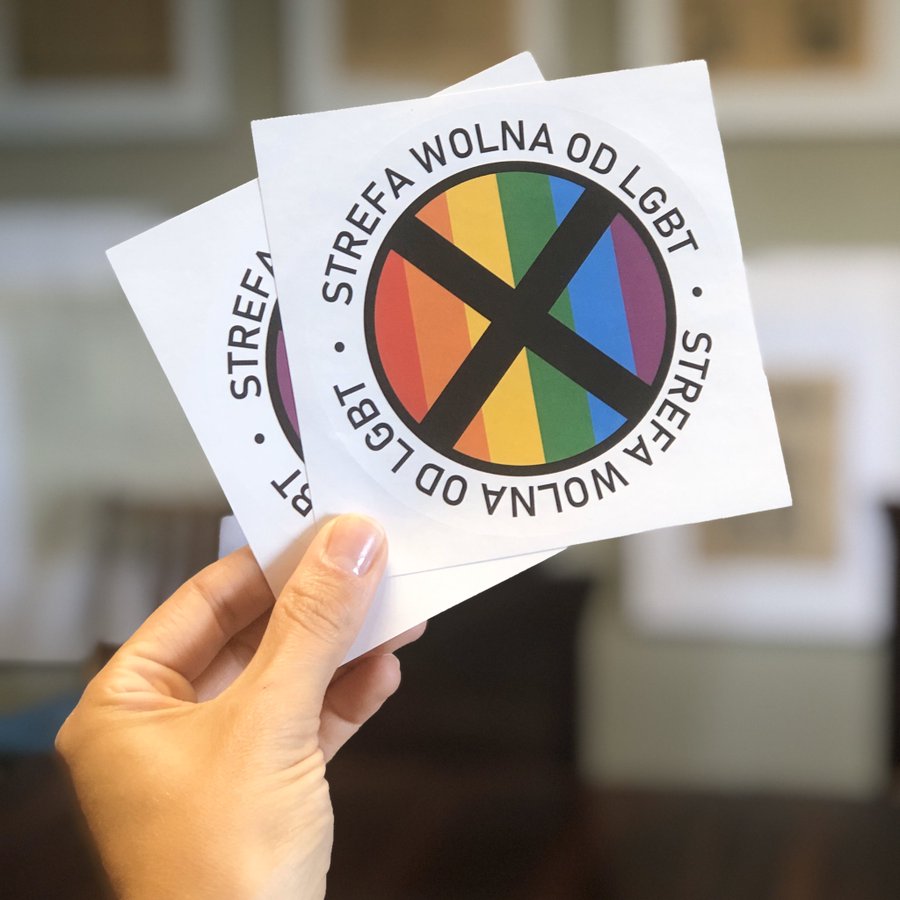
ILGA-Europe launched an-hour long Twitter Storm demonstration on February 11, calling on the European Commission to take infringement procedures against Poland, making the Polish-based hashtag #infringementNOW trend
An online action, created by Brussels-based ILGA-Europe in association with the Polish LGBTI rights organisation Campaign Against Homophobia (KPH), has been supported by many politicians, MEPs, diplomats, political party groups, NGOs and human rights defenders from all around the EU and the world.
Other words like #Polish and #Poland were also among the trending topics between 9 and 10 AM in Belgium, which coincided with the European Parliament’s plenary sessions. The hashtag #infringementNOW had more than 2,000 mentions in an hour-long Twitter demonstration.
The action was created to support to a 30-day long campaign by KPH, which has been calling on the EU to initiate an infringement procedure against Poland for violating EU directives with so-called ‘Family Charters’ and ‘LGBT Free Zones’, which over 100 Polish local governments have adopted over the last two years.
https://cdn.embedly.com/widgets/media.html?type=text%2Fhtml&key=a19fcc184b9711e1b4764040d3dc5c07&schema=twitter&url=https%3A//twitter.com/ILGAEurope/status/1359777741055393792&image=
Last September, ILGA-Europe, together with KPH and Poland’s Fundacja Równości (The Equality Foundation), submitted a legal complaint to the European Commission about so-called ‘Family Charters’ and ‘LGBT Free Zones’. The complaint sets out how these declarations introduce discrimination against LGBTI people and thus breach the European Council Directive (2000/78/EC), establishing a general framework for equal treatment in employment and occupation, as well as the Charter of Fundamental Rights Article 15 on Freedom to choose an occupation and right to engage in work, and Article 21 on non-discrimination.
The campaign is not over!
Until the European Commission takes infringement procedures against Poland, let’s keep calling on it to take action. Tweet this message, and ask your followers and other stakeholders to tweet it also:
Time 4 #infringementnow against Poland 4 violating fundamental rights of EU citizens & disregarding EU treaties with so-called ‘LGBT-Free Zones’ & ‘Family Charters’. EC President @vonderleyen, what’s holding the @EU_Commission back from taking action? @helenadalli @VeraJourova
You can find an image to include with your tweet here.
For inspiration, take a look at what happened during our Twitter-storm demonstration:
Many activists tweeted #infringementnow!
Human Rights organisations also joined the call
Members of the European Parliament called the European Commission to take action.
Turkish government steps up its attacks on LGBTI+ citizens

Europe’s leading LGBTI+ rights organisation, ILGA-Europe are alarmed to observe that in the past week the Turkish government has stepped up its systematic attacks on and defamation of LGBTI+ people and calls on President Erdo?an to guarantee the fundamental rights of all minorities without discrimination, as enshrined in the country’s Constitution.
Over the past week in Turkey, both government and government-supported media have called LGBTI+ people a “disgrace”, “dirty” and “perverts”, which has prompted a wave of hate-speech on social media.
President Recep Tayyip Erdo?an held video conferences on Monday 1 February and Wednesday 3 February denouncing LGBT people and praising his supporters saying: “We will carry our young people to the future, not as the LGBT youth, but as the youth that existed in our nation’s glorious past.”
On February 2, Justice Minister and the Interior Minister Süleyman Soylu called LGBT people “perverts” on Twitter. The social media platform has since flagged the tweet as violating its rules against “hateful conduct”.
This new campaign takes place in the context of rising hateful rhetoric against the LGBTI+ community by representatives of high-level religious and political institutions in Turkey, as well as actions and legislation attacking human rights defenders and civil society organisations.
Crackdown on freedom
The step-up in governmental anti-LGBTI+ rhetoric comes as academic staff and students at Bo?aziçi University of Istanbul have been protesting the appointment of the University’s new Rector, Melih Bulu, by President Erdo?an on 1 January 2021. Melih Bulu’s appointment is being protested because Bulu is the first appointed rector from outside the University, a move that further extends the government’s crackdown on academic freedom in Turkey.
The new Rector is a long-standing ally of President Erdo?an and his ruling party, and has held different positions in the party for years. He has supported anti-LGBTI+ statements from the Erdo?an government. Professors at Bo?aziçi University and students alike are concerned about the future of academic freedom, freedom of expression, freedom of assembly and freedom of association at the University.
Using COVID-19 to slander LGBTI people
In addition to the systematic attacks and bans that Turkey’s LGBTI+ movement has experienced at the hands of Turkish authorities since 2015, in 2020 the government seized upon the COVID-19 crisis as an opportunity to slander LGBTI+ people. In April last year, the President of the Directorate of Religious Affairs, Ali Erba? targeted LGBTI+ people and people living with HIV, equating homosexuality with a disease, stating that “hundreds of thousands of people a year are exposed to the HIV virus caused by this great haram, which passes as adultery in the Islamic Literature,” and blaming lesbian and gay people for COVID-19. He was quickly supported by leading governmental figures including the Minister of Family, Labour and Social Services, and President Erdo?an himself.
According to Evelyne Paradis, Executive Director of ILGA-Europe: “The Turkish government has an obligation to protect everyone from hate crime and discrimination, and should not be part of any statements that could encourage hate crimes and target any minority group, including LGBTI+ people.
“We recall that as a founding member of the United Nations, Turkey pledged to protect inherent dignity and the equal and inalienable rights of all members of the human family. In addition, as a Member State of the Council of Europe and having ratified the European Convention of Human Rights, Turkey must uphold European human rights law, which prohibits a discriminatory application of human rights.
“We call on Turkey to respect, guarantee, protect and fulfil the fundamental rights of the LGBTI+ community without discrimination as enshrined in its Constitution and equality article therein, and ratified by human rights treaty bodies,” Paradis concluded.
Further information:
- Find out more about LGBTI rights in Turkey in our Rainbow Map.
For comment, contact Ana Muñoz, ILGA-Europe: ana@ilga-europe.org / +32 493 35 60 55
Poland: All charges against LGBTI rights defenders charged for peaceful activism must be dropped, say Human Rights NGOs
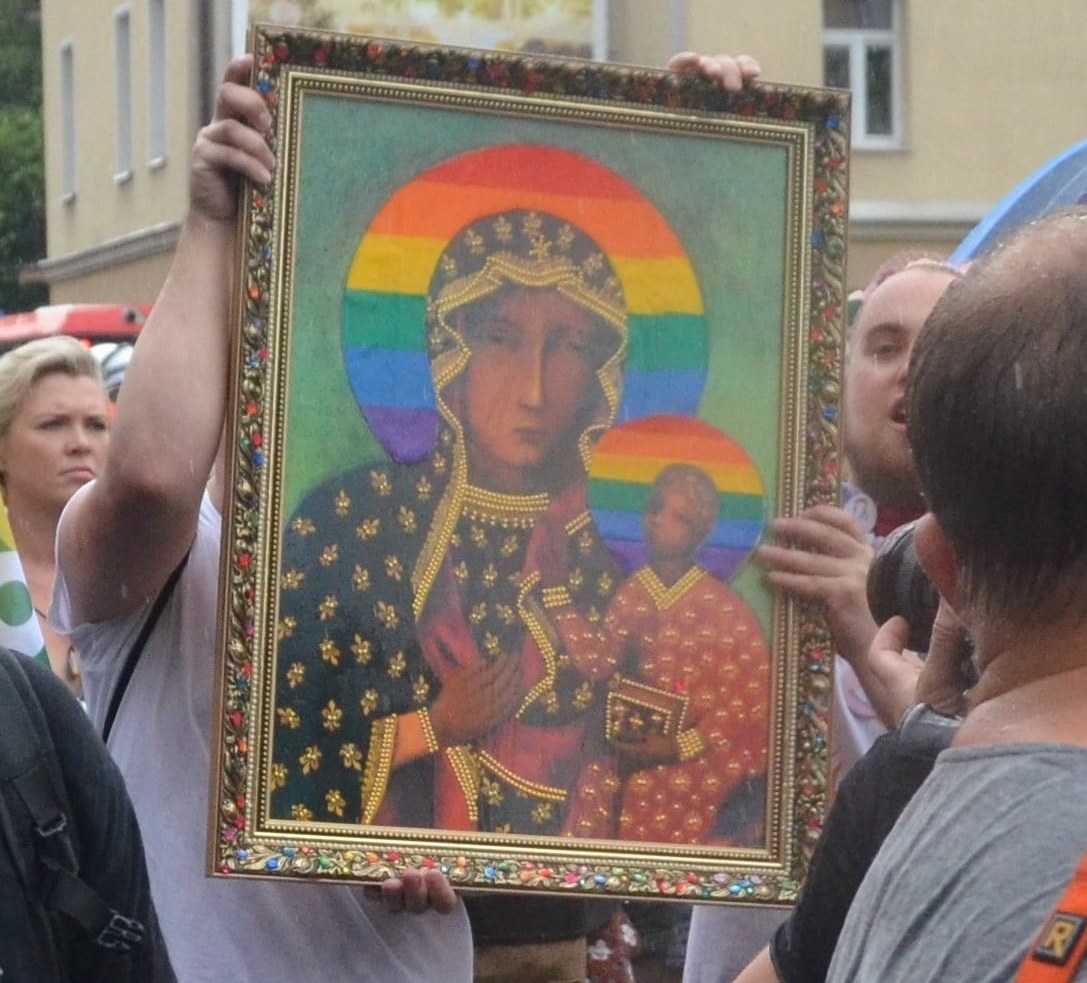
The trial of three women accused of “offending religious beliefs” will take place, tomorrow on January 13 in Plock, Poland. The activists face up to two years in prison for disseminating posters of the Virgin Mary with a rainbow halo symbolic of the LGBTI flag. Six international human rights NGOs are calling for all charges to be dropped, and for the Polish authorities to amend their legislation and bring it in line with international and regional human rights standards.
After a first postponement in November, the trial against El?bieta, Anna and Joanna (whose surnames are not being used to protect their privacy) will take place this Wednesday, January 13. Under article 196 of the Polish Criminal Code (C.C.), the women are accused of having ‘publicly insulted an object of religious worship in the form of this image which offended the religious feelings of others’ in relation to their display of posters of the Virgin Mary with a rainbow halo on 29 April 2019. If found guilty, the activists face up to two years in prison.
The authorities arrested and detained El?bieta in 2019 after she took a trip abroad with Amnesty International. The authorities opened an initial investigation against her in May 2019, and in July 2020 they officially charged the three activists.
Six non-governmental human rights organisations: ILGA-Europe, Amnesty International, Campaign Against Homophobia, Freemuse, Front Line Defenders, and Human Rights Watch call on the Polish Prosecutor General to drop the charges and ensure that the three women are allowed to carry out their human rights work without harassment and reprisals by the authorities.
RESTRICTING THE RIGHT TO FREEDOM OF EXPRESSION
Creating or distributing posters such as the ones depicting the Virgin Mary with a rainbow halo should not be a criminal offence and is protected under the right to freedom of expression.
In its current formulation, article 196 of the Polish C.C. imposes undue restrictions on the right to freedom of expression by providing overly broad discretion to the authorities to prosecute and criminalise individuals for expression that must be protected. This is incompatible with Poland’s international and regional human rights obligations.
Poland is bound by the International Covenant on Civil and Political Rights (ICCPR), the European Convention on Human Rights as well as the Charter of Fundamental Rights of the EU to respect, protect and fulfill the right to freedom of expression.
Furthermore, in 2013, the Special Rapporteur in the field of cultural rights noted that “Restrictions on artistic freedoms based on insulting religious feelings… are incompatible with [ICCPR]”. In 2019, this was again highlighted by the Special Rapporteur on freedom of opinion and expression, who stressed that criminalising expression that insults religious feeling limits “debate over religious ideas and… such laws [enable] governments to show preference for the ideas of one religion over those of other religions, beliefs or non-belief systems”.
Freemuse is particularly concerned about the policing of artistic and creative content by the authorities in Poland and regard this court case as an unlawful attack on freedom of artistic expression.
Amnesty International has previously called on the Polish authorities to repeal or amend legal provisions, such as article 196 of the Criminal Code, which criminalise statements protected by the right to freedom of expression. Many other national and international human rights organisations have criticised provisions of the Polish Criminal Code, including article 196, as problematic because they constitute restrictions on the right to freedom of expression not permissible under international human rights law.
According to international standards, restrictions on the right to freedom of expression must be provided by law and formulated with sufficient precision to enable an individual to regulate his or her conduct accordingly (Human Rights Committee, General Comment 34 on Freedom of Expression, para. 25). The current formulation of article 196 is not sufficiently precise, leaves space for arbitrary interpretation and allows authorities to arrest, detain, and prosecute people simply for expressing views that may be perceived by others as offensive.
The six organisations state that everyone has a right to express themselves safely and without fear of reprisals, and that the right to freedom of expression is protected, even if some people might find the expression to be deeply offensive (Human Rights Committee, General Comment 34 on Freedom of Expression, para. 11). In the words of the European Court of Human Rights the right to freedom of expression “is applicable not only to information or ideas that are favourably received or regarded as inoffensive or as a matter of indifference, but also to those that offend, shock or disturb the state or any sector of the population”.
According to ILGA-Europe’s Advoacy Director, Katrin Hugendubel: “The case against El?bieta, Anna and Joanna is an example of the repeated harassment activists and human rights defenders face simply for carrying out peaceful activism in Poland, which Polish and international human rights organisations have documented and denounced at length in the last number of years.
“El?bieta, Anna and Joanna stood against hate and discrimination and for years they have been fighting for a just and equal Poland. They deserve to be praised and not taken to court for their activism.”
BACKGROUND
To date, around 140,000 people have joined an international campaign urging the Prosecutor General to drop the unfounded charges against the three women human rights defenders. The campaign is available at https://www.amnesty.org/en/get-involved/take-action/poland-activist-elzbieta-podlesna/.
Amnesty International, Campaign Against Homophobia, Freemuse, Front Line Defenders, Human Rights Watch and ILGA-Europe, remain committed to supporting the three women human rights defenders and campaigning for justice.
El?bieta is one of the 14 women human rights defenders who were beaten and targeted for standing up to hate in Poland during the Independence March in 2018. See their story at https://www.amnesty.org/en/latest/campaigns/2019/04/14-women-blog/.
At the time of her arrest in May 2019, El?bieta had just returned from a trip to Belgium and the Netherlands with Amnesty International, where she participated in several events and advocacy meetings with activists and supporters to raise awareness about the situations of peaceful protesters and the crackdown they are facing in Poland.
To see a timeline on anti-LGBTI hate in Poland, click here.* Article 196 of the Criminal Code makes anyone found guilty of intentionally offending religious feelings through public calumny of an object or place of worship liable to a fine, a restriction of liberty, or to imprisonment for a maximum of two years.
“It feels as if we’re trapped with our abusers.” Ukrainian activist Anna Sharyhina tells the story of unhindered anti-LGBTI abuse in Kharkiv
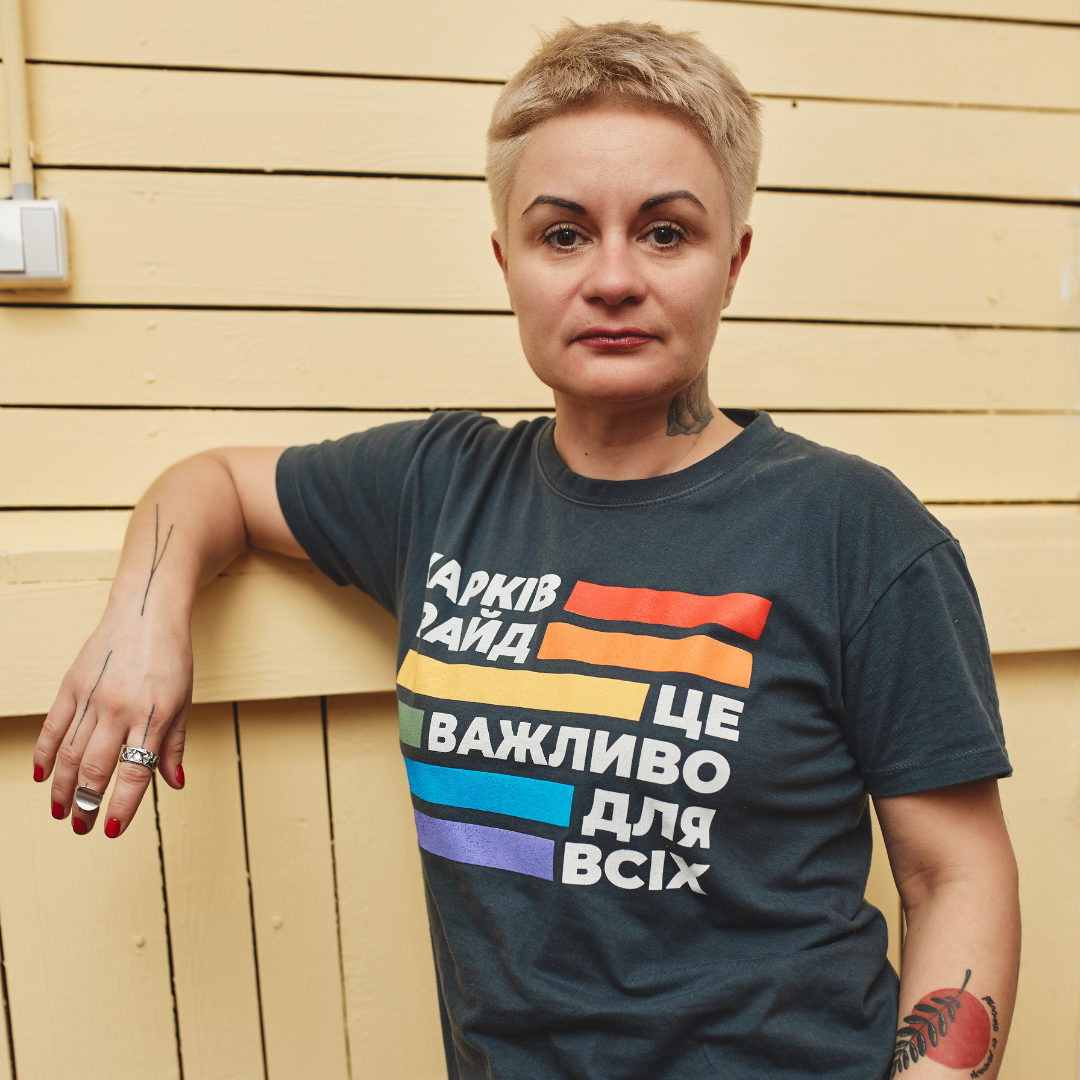
Throughout 2020, LGBTI activists have been harassed, intimidated and threatened by well-known far right groups in Ukraine, while police and local authorities turn a blind eye. Here is activist Anna Sharyhina’s alarming story, and how you can lend her and other LGBTI Ukrainian activists your support.
Two years ago, on New Year’s Eve, Anna Sharyhina gathered with friends and activists at the headquarters of Sphere, the LGBT organisation she cofounded and leads in the Ukrainian city of Kharkiv. At one point during the celebration Anna realised they were trapped. Thugs had padlocked the gate from outside. The group of friends feared the attackers would hurl smoke grenades in, as had occurred at PrideHub, Kharkiv’s LGBT+ friendly community centre. Little did Anna know that this would be the first of over 20 attacks she would both witness and suffer personally over the next two years.
Anna Sharyhina has been involved in LGBTI activism for over ten years and she is well-known in the community. This year she was part of organising the first ‘Pride on Wheels’ in Ukraine, a creative celebration of amid COVID-19 restrictions. Her active role in Kharkiv’s political, social and cultural life and her visibility in events and media, however, have come at a cost.
The police just stand by and watch
The façade of PrideHub, which is run by Anna and Sphere, has been covered with graffiti, featuring death threats and abusive language, and its windows have been shattered. Urine, feces, and blood have been smeared on its front door. At some events, groups of men have blocked the entrance locking their arms in a human chain. Activists and guests at the centre have been filmed and mocked online. Recently, a man handcuffed himself at the entrance, disrupting an activist event and barring participants from entering.
On this, as on other occasions, police officers passively stood by and watched. None of the complaints filed by LGBTI activists in Kharkiv have been followed up. Despite the evidence from the video surveillance system installed at PrideHub, no investigation has been carried out. By taking no action, police and local authorities are failing to protect citizens and their rights to freedom of association, assembly and expression, as well as ignoring Ukraine’s criminal code. Only at Pride celebrations, when the international community is watching, do the authorities provide actual protection.
Threats on her phone
The group behind the attacks is the far-right Tradition and Order. It has been active in different cities in Ukraine and is known for its use of violence and intimidation against those fighting for equality, gender diversity and women’s rights.
LGBTI organisations have been documenting the rise of organised violence against LGBTI activists, organisations and events for several years, calling for LGBTI-inclusive hate crime legislation. Ukraine has an obligation under the EU-Ukraine Association Agreement to introduce hate crime legislation that includes sexual orientation and gender identity as protected grounds.
Anna says she feels as if they are trapped in a locked room with their abusers, and everyone is looking away. Along with the attacks on Sphere, she receives threats on her phone on a regular basis. Allies and partner organisations who have been involved in projects with her, have also been intimidated. For example, a long-time partner organisation, an educational centre that’s openly LGBTI-friendly, received a group of visitors who threatened them with violence unless they stop their cooperation with Sphere.
Much of the harassment and intimidation seems to be centered on Anna, and follows the path of the projects and collaborations that feature her. The pressure intensified after a course that she taught on the prevention of bullying in schools. Violent opponents come to her lectures and discussions, disrupting them. This is especially threatening for people who are new to activism or to the topics at hand.
Dealing with this situation and reacting to attacks in an atmosphere of impunity is taking a great personal toll on Anna, on her colleagues and on Sphere’s work. They see themselves in a swim or sink situation, where swimming is getting harder and harder.
Here is what you can do to support Anna and the LGBTI community in Kharkiv, Ukraine
In this worrying scenario, Anna and her team continue to believe in their mission and commitment to the LGBTI community in Kharkiv and elsewhere. But dealing with security in the absence of any law enforcement takes more and more resources. Activists should not have to do this alone. You can help them by:
Spreading the word. Share Anna’s and Sphere’s story and help them stay in the spotlight until the Ukrainian authorities take action to prevent harassment and violence. Visibility helps!
Speaking up. Are you part of a human rights organisation or an activist initiative? Issue a statement or write an article about Anna’s and Sphere’s case. Tell Ukrainian and international political representatives that the violence and harassment against Anna Sharyhina, other LGBTI activists and their allies in Kharkiv must stop.
The following contacts in Ukraine can make a difference. They can make sure that the threats and attacks against Anna and Sphere are properly addressed by the police. They can prevent further threats and violence by publicly condemning violence against LGBTI and other human rights defenders and sending a clear signal that it will not be tolerated.
Contact them with your statements, tag them in your posts, and tell them that it is time to take action:
- Liudmila Denisova, Human Rights Ombudsperson: https://www.facebook.com/denisovaombudsman/
- Igor Terekhov, Acting Mayor of Kharkiv: https://www.facebook.com/igor.terehov.kh
- Alyona Stryzhak, Head of the Kharkiv Patrol Police Department: https://www.facebook.com/alyona.stryzhak.9
- Andriy Rubel, Chief of the Main Directorate of the National Police: https://www.facebook.com/people/%D0%90%D0%BD%D0%B4%D1%80%D1%96%D0%B9-%D0%A0%D1%83%D0%B1%D0%B5%D0%BB%D1%8C/100059591866063
- Serhiy Knyazev, Adviser to the Minister of Interior: https://www.facebook.com/sergii.knyazev
- Arsen Avakov, Minister of the Interior: https://www.facebook.com/arsen.avakov.1
Turkish court postpones trial of 19 Pride attendees, infringing their right to fair judicial process
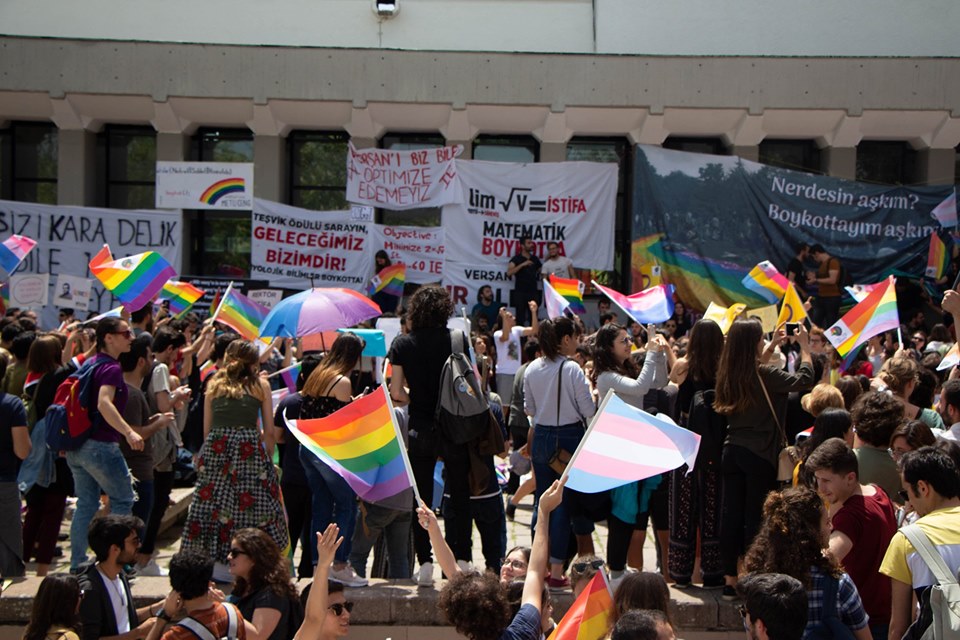
The Turkish courts’ postponement until next April of the trial of 19 people accused of “unlawful assembly” after taking part in an LGBTI Pride march last year is clearly infringing their right to a fair trial, and sending a worrying signal from the judiciary, says ILGA-Europe.
During the hearing, all the defendants gave testimonies explaining how this trial is a cloud over their heads which negatively impacts their everyday lives. The trial has lasted one and a half years so far, and has affected them personally, academically, and professionally. This further postponement to 30 April 2021 means that the defendants will have been under this pressure for almost two years, and they argue that this constitutes a violation of their human rights.
According to Özgür Gür, from METU LGBTI+ Solidarity: “This trial is not only against the METU students, but against Pride marches around the country.”
Melike Balkan, from METU LGBTI+ Solidarity added: “We have repeatedly asked the police to give us the reason for their presence at the campus, and they continued to point to the ban by the governor of Ankara, but it is clear through the Turkish governments’ response to the UN that the governor could not ban an event on campus grounds. Police forces misled us and prevented us from exercising our basic human rights.”
According to Katrin Hugendubel, Advocacy Director at ILGA-Europe: “LGBTI rights have been systematically attacked in Turkey in recent years and by postponing the trial yet again without any comprehensible reasons, the courts are clearly infringing the right to a fair trial and fair judicial process. This is a worrying signal from Turkey’s judiciary, especially in the context of rising hate-crime and hate-speech against the LGBTI community in the country. In 2020, LGBTI activists in Turkey have seen their offices targeted by violence, their online spaces restricted, and the LGBTI community has been blamed for the COVID-19 pandemic by religious and political leaders.
“The right to freedom of assembly, which Turkey is bound to respect according to its Constitution and the European Convention on Human Rights, to which it is a party, needs to be clearly upheld. ILGA-Europe will continue to work with international institutions and supporters to try to ensure a fair trial that will respect the right to freedom of assembly and non-discrimination of LGBTI people in Turkey, and which will acquit the unlawfully accused activists at the next hearing.”
On Wednesday, in a separate case, a district court in Istanbul ruled that last year’s ban on the city’s Pride march was unlawful and in breach of the Turkish Constitution, the European Convention on Human rights, and other international agreements to which Turkey is party.
Further information:
- Read our joint statement with 8 international human rights organisations here, and download it in English and Turkish.
- Read our pre-trial press release, published on 7 December 2020.
- Timeline of the story so far.
For further comment, contact: Ana Muñoz Padrós, ILGA-Europe: ana@ilga-europe.org, +32 493 35 60 55
Joint statement: The only just outcome is the acquittal of the METU Pride human rights defenders
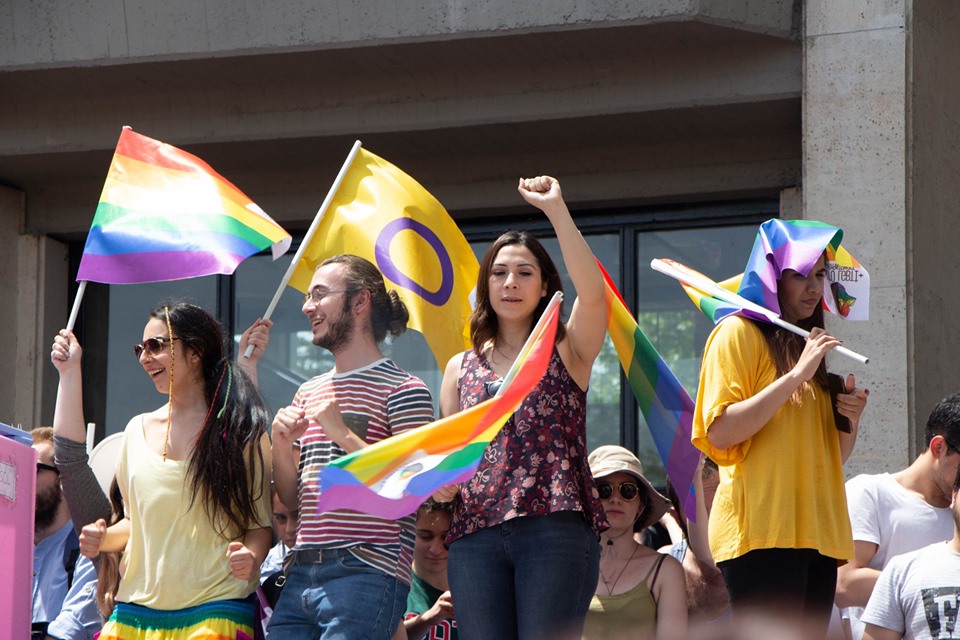
We, the undersigned human rights organisations, believe that the only just outcome in the unfair prosecution of 19 human rights defenders for their participation in a peaceful Pride march on the campus of Ankara’s Middle East Technical University (METU) on 10 May 2019 is their wholesale acquittal at their next hearing on 10 December at 09:00 UTC+3.
The human rights defenders face charges of “participating in an unlawful assembly” and “failing to disperse despite being warned,” despite the fact that earlier in the year, on 21 February 2019, the Ankara Administrative Appeals Court had lifted the blanket ban prohibiting all LGBTI+ activities in Ankara introduced under the state of emergency, which was used as the legal basis to ban the march. The regional court lifted the ban on the grounds that it was unlawful and restricted rights and freedoms in unconditional, vague, and disproportionate ways.
METU Pride had been organised peacefully every year since 2011. However, on 6 May 2019, the administration of METU unlawfully banned the METU Pride march. Since the administration’s decision contravened the Ankara court’s ruling, activists and students exercised their legal right to freedom of assembly and gathered to proceed with their annual march. The university administration then contacted the Ankara Security Directorate asking them to intervene to prevent the march from taking place.
The police used excessive force on peaceful protestors on the day: tear gas and plastic bullets were fired at the crowd, students were dragged across the ground, pushed up against trees and sustained head injuries. The excessive force used during the police intervention is a clear violation of the right to peaceful assembly, which is protected under domestic law and international laws, including the European Convention of Human Rights, to which Turkey is a party.
Despite there being ample video footage of the police violence, to-date, none of the police officers seen using excessive force have been charged. On the contrary, 18 students and an academic who were exercising their right to freedom of assembly were detained, charged and prosecuted, facing a possible prison sentence of up to three years.
In June 2020, the Ankara Administrative Court No. 7 made reference to the 2019 ruling by the Ankara District Administrative Court No. 12 which quashed the blanket ban on all LGBTI+ events in the capital in place since 2017, stating that “although specific assemblies and demonstrations may be banned, the right to peaceful assembly and demonstration should be protected as an inalienable right in a democratic society” and that “the State has an obligation to take necessary measures to ensure this right can be exercised securely”. This ruling confirms that the METU administration’s ban on the May 2019 Pride March on campus had no legal basis.
We therefore call on the trial prosecutor to recommend the acquittal of all the human rights defenders at the hearing on 10 December, and for all the relevant authorities in Turkey to ensure that the security forces and METU administration uphold the right to freedom of peaceful assembly as enshrined in domestic law and international human rights law, by ensuring that future Pride marches at METU campus and in Ankara take place without obstruction. We also call on the Turkish authorities to conduct a prompt, independent and impartial investigation into the excessive use of force by the police on the campus, and for police officers responsible for arbitrary or abusive force to be brought to justice.
- Agir ensemble pour les droits humains
- Amnesty International
- Civil Rights Defenders
- Front Line Defenders
- Human Rights Without Frontiers
- ILGA-Europe – the European Region of the International Lesbian, Gay, Bisexual, Trans and Intersex Association
- International Federation for Human Rights (FIDH), within the framework of the Observatory for the Protection of Human Rights Defenders
- Netherlands Helsinki Committee
- World Organisation Against Torture (OMCT), within the framework of the Observatory for the Protection of Human Rights Defenders
Further information:
- Read our press release dated 7 December 2020.
- Watch and share our video on Twitter in support of the METU LGBTI+ Solidarity’s campaign.
- Timeline of the story so far.
Poland: Drop charges against women rights defenders

NGOs call to drop unfounded charges for peaceful activism.
Unfounded charges of “offending religious beliefs” are being brought against three women human rights defenders in Poland for simply exercising their right to freedom of expression, a coalition of six nongovernmental groups said today. The first hearing in their case is scheduled for November 4, 2020 in the town of Plock.
The Prosecutor General should drop the charges – and ensure that the three women are allowed to carry out their human rights work without harassment and reprisals by the authorities. The groups are Amnesty International, Campaign Against Homophobia, Freemuse, Front Line Defenders, Human Rights Watch and ILGA-Europe.
The Polish authorities should amend their legislation and bring it in line with international and regional human rights standards and abstain from using it against activists to unduly curtail their right to freedom of expression.
The case against the three women human rights defenders
The three human rights defenders, El?bieta, Anna and Joanna – whose surnames are not being used to protect their privacy – are facing trial for ‘offending religious beliefs’ under article 196 of the Criminal Code (C.C.) in relation to the use of posters depicting the Virgin Mary with a rainbow halo symbolic of the LGBTI flag around her head and shoulders. The authorities are alleging that the three activists pasted the posters on 29 April 2019 in public places such as on portable toilets, dustbins, transformers, road signs, building walls in public areas in the city of Plock and have ‘publicly insulted an object of religious worship in the form of this image which offended the religious feelings of others’. They now face up to two years in prison if found guilty for their peaceful activism.
The authorities arrested and detained El?bieta in 2019 after she took a trip abroad with Amnesty International. The authorities opened an initial investigation against her in May 2019 and in July 2020, they officially charged the three activists.
A criminal offense unduly restricting the right to freedom of expression, including with respect to artistic expression
Having, created or distributing posters such as the ones depicting the Virgin Mary with a rainbow halo should not be a criminal offense and is protected under the right to freedom of expression.
In its current formulation, article 196 of the C.C. imposes undue restrictions on the right to freedom of expression by providing overly broad discretion to the authorities to prosecute and criminalize individuals for expression that must be protected. This is incompatible with Poland’s international and regional human rights obligations.
Poland is bound by the International Covenant on Civil and Political Rights (ICCPR), the European Convention on Human Rights as well as the Charter of Fundamental Rights of the EU to respect, protect and fulfill the right to freedom of expression.
Furthermore, in 2013, the Special Rapporteur in the field of cultural rights noted that “Restrictions on artistic freedoms based on insulting religious feelings… are incompatible with [ICCPR]”. In 2019,this was again highlighted by the Special Rapporteur on freedom of opinion and expression who stressed that criminalising expression that insults religious feeling limits “debate over religious ideas and… such laws [enable] governments to show preference for the ideas of one religion over those of other religions, beliefs or non-belief systems”. Freemuse is particularly concerned about the policing of artistic and creative content by the authorities in Poland and regard it as an unlawful attack on freedom of artistic expression.
Amnesty International has previously called on the Polish authorities to repeal or amend legal provisions, such as article 196 of the Criminal Code, that criminalize statements protected by the right to freedom of expression, for example in the report ‘Targeted by hate, Forgotten by Law: Lack of a coherent response to hate crimes in Poland’. Many other national and international human rights organizations have criticized provisions of the Polish Criminal Code, including article 196, as problematic because they constitute restrictions on the right to freedom of expression not permissible under international human rights law.
International human rights law permits states to impose certain restrictions on the exercise of the right to freedom of expression only if such restrictions are provided by law and are demonstrably necessary and proportionate for the protection of certain specified public interests (national security, public order, protection of health or morals) or for the protection of the rights of others (including the right to protection against discrimination). When restricting the right to freedom of expression to protect public order or morals, the Human Rights Committee, which interprets the ICCPR, observed that states must not base their restrictions on principles deriving “exclusively from a single tradition” e.g. Christianity. States may impose certain restrictions on certain forms of expression if they can demonstrate that such restrictions are necessary and proportionate to the specified purpose (that is, the measure is designed to be effective in achieving its goal, lesser measures do not suffice and without putting in jeopardy the right itself). The current formulation of article 196 of the C.C. does not appear to pass the test of proportionality and necessity.
According to international standards, restrictions on the right to freedom of expression must be provided by law and formulated with sufficient precision to enable an individual to regulate his or her conduct accordingly (Human Rights Committee, General Comment 34 on Freedom of Expression, para. 25). The current formulation of article 196 is not sufficiently precise, leaves space for arbitrary interpretation and allows authorities to arrest, detain, and prosecute people simply for expressing views that may be perceived by others as offensive.
The organizations recall that everyone has a right to express themselves safely and without fear of reprisals, and that the right to freedom of expression is protected, even if some people might find the expression to be deeply offensive (Human Rights Committee, General Comment 34 on Freedom of Expression, para. 11). In the words of the European Court of Human Rights the right to freedom of expression “is applicable not only to information or ideas that are favorably received or regarded as inoffensive or as a matter of indifference, but also to those that offend, shock or disturb the state or any sector of the population”.
The unfounded charges should be dropped
El?bieta, Anna and Joanna now face up to two years in prison if found guilty under the unfounded charges brought against them. The case against them is not unique but an example of the repeated harassment activists and human rights defenders face simply for carrying out peaceful activism in Poland, which Polish and international human rights organizations have documented and denounced at length in the last several years.
El?bieta, Anna and Joanna stood against hate and discrimination and for years they have been fighting for a just and equal Poland. They deserve to be praised and not taken to court for their activism.
Background
To date, around 140,000 people have joined an international campaign urging the Prosecutor General to drop the unfounded charges against the three women human rights defenders.
Amnesty International, Campaign Against Homophobia, Freemuse, Front Line Defenders, Human Rights Watch and ILGA-Europe, remain committed to supporting the three women human rights defenders and campaigning for justice.
El?bieta is one of the courageous 14 women human rights defenders who were beaten and targeted for standing up to hate in Poland during the Independence March in 2018. See their story at
At the time of her arrest in May 2019, she had just returned from a trip to Belgium and the Netherlands with Amnesty International, where she participated in several events and advocacy meetings with activists and supporters to raise awareness about the situations of peaceful protesters and the crackdown they are facing in Poland.
Mental Health: Dealing With Stress as an LGBTI activist
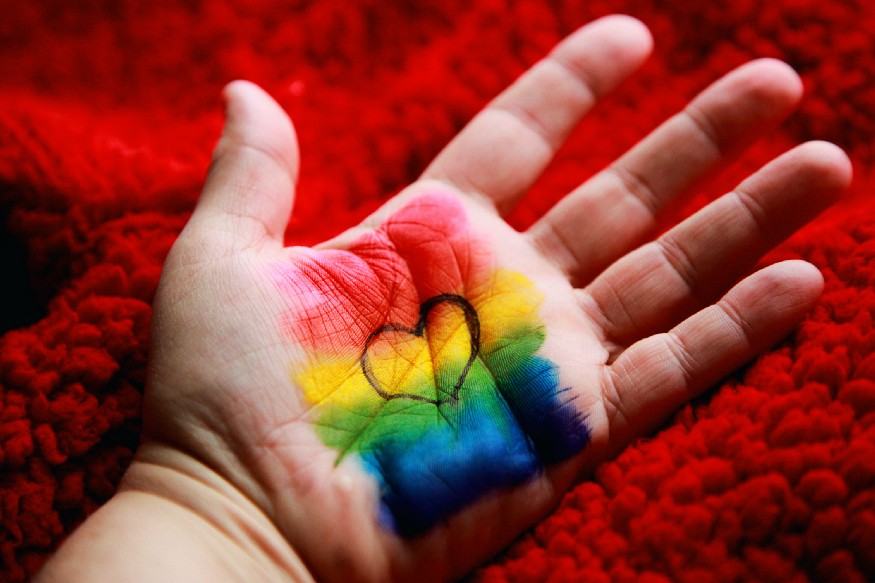
2020 has drastically altered our daily lives and as an activist it’s easy to put your mental health and wellbeing on the back burner, while you get on with other hugely pressing priorities. On top of this, LGBTI activists can suffer from particular mental health stresses that stream from discrimination, LGBTIphobia, and the uphill battle that working to secure our rights and equality can be. To mark World Mental Health Day, this blog brings you some tools to help you cope with challenges that come your way.
“A field that has rested gives a beautiful crop.” — Ovid
It’s been a remarkably arduous year for all of us on a global level, and considering that LGBTI communities can carry additional burdens, it’s especially important to take care of our mental health and wellbeing. Mental health, as defined by the World Health Organisation (WHO), is a state of well-being in which an individual realises their own abilities, can cope with the normal stresses of life, can work productively, and is able to make a contribution to their community. We can think that because we don’t have a particular mental health condition, that we are fine, but mental health is more than the absence of mental disorders.
The particular stresses on LGBTI activists
Stress is a totally natural reaction — it is the way our bodies respond to challenges in our environment. Having a certain amount of stress is positive as it can improve our motivation and effectiveness. Yet, intense and prolonged stressful situations affect our wellbeing. Here are some particular stresses that LGBTI activists face every day.
- Facing LGBTIphobia in both real life situations and on a daily informational basis
- Being overwhelmed by perceived and real barriers to positive change
- Being overwhelmed by negative news
- Being overwhelmed by too much work, often with no financial compensation
- Being overwhelmed by the perceived and real expectations of the community
Stress affects our body (physical reactions), it influences our mood (emotional responses), and it changes our behaviour. In the table below are the examples of different types of reactions that may arise.
How to effectively deal with stress
There is no universal solution to deal with stress, because:
- Stress is person specific — what stresses one person may not stress another person in a similar situation.
- Stress is time specific — what may stress one person at one point in time, it may not stress them at another time, sometimes because their experience mitigates it or the stress has become cumulative.
- Stress is context specific — having similar experiences in different contexts, for example, a context where you count on supportive relationships while another where you don’t, can fundamentally shift the experience of stress.
So, it stands to reason that dealing with stress is an individual thing. We need to identify the key factors of why and how we get stressed, and look at ways of changing them. For instance, how do you take care of your stress levels when going into a particular situation, say one of conflict with an anti-LGBTI group? What are the things you can put in place for yourself to manage the stress in that moment, such as breathing consciously or repeating a calming mantra in your mind? What are the ways your work as an LGBTI activist gets you stressed? If for instance, you can become overwhelmed by how much you are needed, how do you find ways to disengage for a moment so that you can tune into your stress levels? What are the self-compassionate breaks you can put in place for yourself on a daily basis that take you away from being overwhelmed? Activism is based in compassion for the human race, and you are part of that, so you need to be compassionate towards yourself as you do this work.
Stress is individually experienced, based on our own personalities and circumstances, but here are five universal elements for coping with stress in your daily life:
- Check how stressed you are: are there some signs of stress mentioned in the table above?
- Identify what is causing your stress — observe your daily routine and identify the triggers. It is important to know what is causing stress.
- Take care of the basics — try to eat healthy food, do some physical exercises, and have proper sleep.
- Make sure there is space in your daily routine for pleasant things: a walk in the park, a chat with a friend, cooking a meal — anything what brings you positive feelings.
- Talk to other people about your stress and ways to relieve it. You can talk to people you trust (friends, colleagues etc.) or you can appeal to the help of specialists / coaches / consultants. Currently there are plenty of people and organisations offering professional help on burn-out prevention.
Podcast: What’s it like being LGBTI in Poland in 2020?
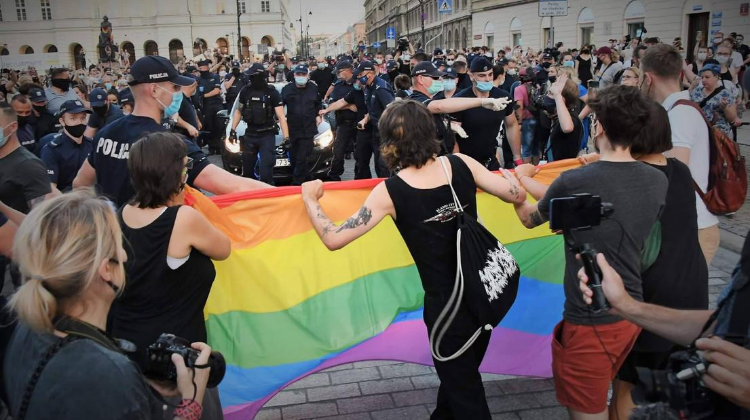
Poland has reached a dangerous boiling point in its state-driven discrimination against LGBTI people. The first episode of ILGA-Europe’s podcast, The Frontline, goes behind the scenes to talk about a way forward for LGBTI activism in the country. Here’s what it’s all about…
Poland has been making international headlines over the past few years for its increasing state driven homophobia and transphobia, pushed by public representatives in both the political and religious arenas, but how is the situation experienced on the ground for ordinary LGBTI people? In the first episode of ILGA-Europe’s new podcast, The Frontline, we talk to Polish activist Slava Melnyk, from LGBTI organisation KPH, and David Socha, a young gay man living in the city of Pulawy, which was declared one of Poland’s so-called LGBT-Free Zones last year. Stay with us until the end to hear the ILGA-Europe team discuss the happenings in Poland as part of a wider trend, how Europe should respond, and strategic thinking for the Polish LGBTI movement.
“The issue is very divisive,” says Warsaw-based activist Slava Melnyk in an interview with The Frontline, ILGA-Europe´s brand new podcast. In the aftermath of the re-election of far-right President Andrzej Duda and protests in early August, in solidarity with activist Margot Szutowicz, who was arrested and now awaits trial, the situation for LGBTI people in Poland has reached a dangerous boiling point. However, despite state-driven LGBTphobia, illustrated by the rise of the so-called ‘Family Charter’ and LGBT-free Zones across the country, there are many Polish people who disagree with the ruling PiS party’s stance on ‘LGBT ideaology’.
“When I walk down the street, every other building has a rainbow flag as a gesture of solidarity and support for the movement,” says Melnyk.
In the very first episode of The Frontline we delve deep into the situation for LGBTI people in Poland and the work of activists amid the rise of official anti-LGBTI campaigning and the recent crackdown. Along with Slava Melnyk from KPH (Campaign Against Homophobia), David Socha, a young gay man living in one of Poland’s LGBT-free Zones, tells us about how this has affected his day-to-day life, and the ILGA-Europe advocacy team discuss the role of the EU institutions and external actors, and ways forward for the LGBTI movement in Poland.
David Socha was “shocked and enraged” when he learnt his town, Pulawy, had been declared an LGBT-Free zone. “I feel a sense of dread that people who pass by me might insult me,” he tells The Frontline. “I’ve heard from my friends that it only takes being in the wrong place at the wrong time, that will get you beaten… I’ve had friends saying that LGBTI people are ill and that they shouldn’t exist.”
On Monday 14 September, ILGA-Europe together with Polish LGBT rights organisations KPH (Campaign Against Homophobia) and Fundacja Równo?ci (The Equality Foundation) submitted a legal complaint to the European Commission about the so-called Family Charters and LGBT-free zones, which over 100 Polish local governments have adopted over the last two years.
“The European Commission and Council can no longer remain silent in the face of such blatant violations of the principle of non-discrimination by a member state,” said Katrin Hugendubel Advocacy Director of ILGA-Europe.
Rounding up our episode, Katrin and ILGA-Europe’s Senior Litigation Officer, Arpi Avetisyan talk about the trend that the rise of LGBTphobia in Poland is part of, strategic ways forward for the Polish LGBTI activists, and how Europe can take effective action to remedy the situation.
To access our timeline charting the rise of LGBTI hate in Poland, visit this link, check out Poland’s position in our Rainbow Map 2020 and the Poland chapter in our Annual Review 2020.
How you can help persecuted Russian LGBT+
activist, Yulia Tsvetkova
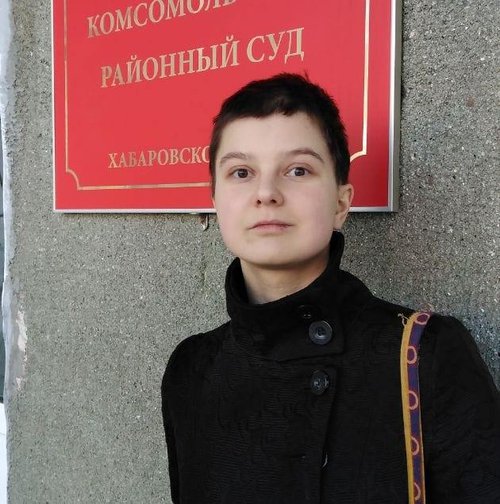
By the end of 2018, at the age of 25, Yulia Tsvetkova had already made some of her
dreams come true: opening a theatre for kids, launching a sex-ed project for
teenagers, and creating feminist resources online. A year later and ever since, this
feminist and LGBT+ activist is facing up to six years in prison, is receiving death
threats, and cannot leave her town in Russia’s Far East. Only in 2021 the long and
torturous investigation led to a trial and in October she had a first administrative win
among the many charges she’s facing. Read on to learn more about Yulia’s story and
the ways you might help her.
*Updated in November 2021
This is Yulia Tsvetkova from Komsomolsk-on-Amur in Russia’s Far East. Yulia is a
feminist, an LGBT+ activist, an artist, and a founder of a theatre studio for teenagers.
“I am a scary woman,” she says.
Wondering why? Read on and judge for yourself.
Yulia began 2019 having achieved a lot and with big plans in store. To mark the first
day of that year, and to take stock of the past 12 months, she posted this online:
“2018 became a year of a major shift for me. It happens sometimes that important things
arrive all at once. This year, I opened my own theatre, a community centre and an online group. Towards the end of the year, I launched a project that I had dreamed about for many years – sex-ed for teenagers. If somebody had told me a year ago that it would have turned out like this, I’d have laughed wholeheartedly…
Many of these things would not have happened without the examples of the amazing
people who came into my life and showed me that dreaming about a better world is both
possible and necessary, and that we all are able to change what’s around us.”
Fast-forward to the first day of 2020 — and Yulia celebrated New Year under house
arrest, with a tracking bracelet on her ankle.
What happened in-between?
During 2019, Yulia carried on with her freshly-launched activist and theatre initiatives.
She hosted events at the LGBT-friendly community centre. She contributed lots of
content to her online awareness-raising projects: Vagina Monologues on
destigmatising women’s bodies; Komsomolka on feminism; and Dandelion field on
sex-ed for teenagers. Together with the young members of her theatre group, Merak,
she had a youth theatre festival in the making with four plays to present that coming
March.
Then, just two months into 2019, anonymous complaints, threats, and calls from the
police began creeping into Yulia’s life. She was forced to cancel the theatre festival, due
to pressure from the local authorities. Visits to the police station for questioning
quickly became a routine and constant part of her days.
On one of her visits to the police, she learned that her drawings promoting body
positivity were deemed “pornography” by law enforcement agents. Concerns were
raised about her “A woman is not a doll” series, in which schematic depictions of
women are accompanied by affirmations like: “Living women have body fat, and that’s
normal;” “Living women get wrinkles and grey hairs, and that’s normal;” and “Living
women have muscles, and that’s normal”. A couple of teenagers from Yulia’s theatre
group and some followers of her online communities were called in for questioning
too.
The “Vagina Monologues” online community that Yulia led drew the attention of the
police as well. It’s community featured abstract depictions of female sexual organs and
educational drawings of women’s bodies.
Invitations from the local police for ‘informal questioning’ stopped later in the fall of
2019.
But Yulia’s story was about to take a darker turn.
Informal questioning soon gave way to formal interrogations. On 20 November 2019,
Yulia Tsvetkova was arrested and put under investigation for “distribution of
pornography”.
Yulia was under house arrest for almost four months, from 23 November 2019 until 16
March 2020.
She went through dozens of interrogations and was ordered to undergo a psychiatric
examination.
She was fined for “propaganda of non-traditional sexual relations” twice: in December
2019 and in July 2020. In both cases “propaganda” was found in her online content:
first in the feminist and LGBT+ communities that she ran, then — in a drawing
featuring LGBT+ families and a slogan “Family is where love is. Support LGBT+
families!”
Currently, Yulia is appealing these two decisions. She is also facing a third charge of
“propaganda” based on an online post with illustrations in support of LGBT+ families
in Russia.
She continues to regularly receive death threats, and her formal complaints to the
police are met with complete indifference and inaction.
On 12 January 2021, she was again charged with ‘distribution of pornography’ in
connection with online dissemination of her feminist drawings. This is the fourth time
that the Investigative Committee indicts Yulia on these charges. “It’s the same case, just
the prosecutor’s office does not send the case to court, but returns it for further
investigation”, says Yulia’s mother Anna Khodyreva.
She is still under gag order and cannot leave her town. Yulia’s trial in the
“pornography” case started on 31 March 2021, and she is set to appear in court several
times throughout April to June. The trial is happening behind closed doors, contrary to
Yulia’s defense demands.
In protest, and after two years under investigation that have been already taken away
from her, Yulia went on hunger strike on May 1 to demand an open trial and a speedy
process. An endless delay of the process and its secrecy are taking a toll on Yulia and go
against her right to a due process. Yulia decided to stop the strike on May 7 because of
health considerations and care for her family and close ones.
In October 2021, the Khabarovsk Regional Court overturned the decision of the
Komsomolsk Court to close the Vagina Monologues social media group. The case was
sent for a new consideration to the court of first instance due to violations of Yulia’s
rights during the consideration of the case. If the case would have been lost, it would
Have a look at Yulia’s hearings in the pornography case timeline in
2021
- 31 March: Preliminary hearing
- 12 April: Pre-trial motions
- 1 May to 7 May: Yulia goes on hunger strike
- 6 May: The judge denied Yulia’s request to bring in a public defender. After the
- announcement of charges, the hearing was postponed once again due to absence
- of prosecution’s witnesses.
- 24 May: To be confirmed
- 15 June: To be confirmed
- Check out this blog regularly for more updates!
Here’s how you can help Yulia Tsvetkova
Today, Yulia needs as many eyes as possible on her case and as many messengers as
possible for her story. Your attention and your action matter.
- Write, talk, tweet, draw about Yulia’s story, and invite your friends and social
media community to join. - Browse the FreeTsvet website, launched in Yulia’s support by activists in Russia, for
complete details and solidarity action ideas. - Get creative with your own solidarity action.
- Use the hashtags #заЮлю, #ямыЮлияЦветкова, #свободуюлецветковой, #свободуцветковой on your social media platforms
- Sign this petition.
Poland: International institutions must protect LGBTI citizens and ensure the immediate release of activists
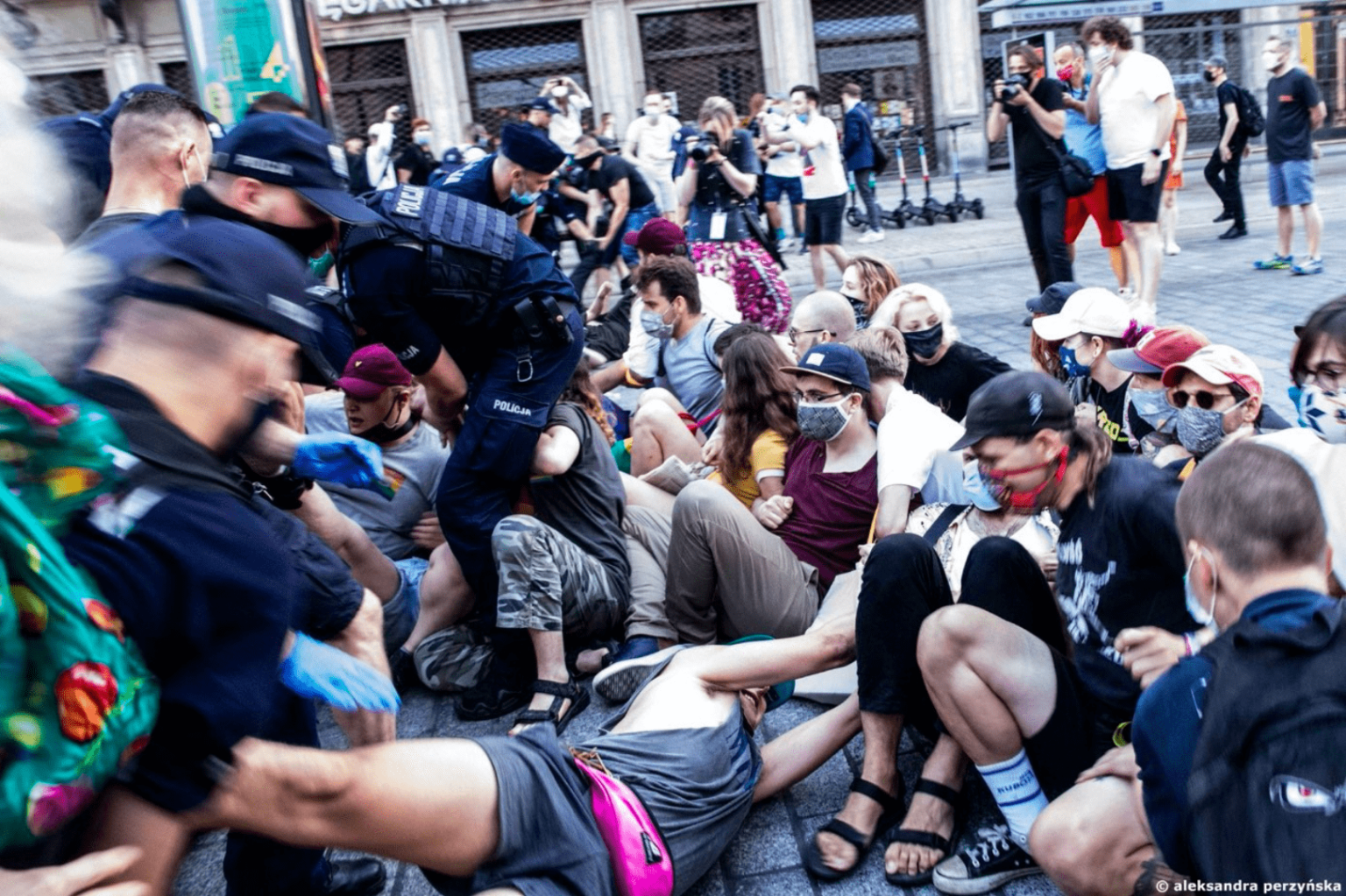
After nearly 2 years of mounting pressure, things came to a boiling point yesterday, August 7, in Warsaw. A spontaneous protest related to the “preventative detention” of an LGBTI activist, Margot Szutowicz, resulted in 48 arrests and extensive police brutality last night. More protests, and more arrests, are expected today as the repression of LGBTI people goes unabated.
The hate campaign against the LGBTI community in Poland has been going on since October 2018 and resulted in LGBTI people becoming a dominant issue during this year’s presidential elections, in which President Duda degraded and scapegoated the LGBTI community on his way to election victory. This included claims that LGBT “are not people, but ideology” and other attempts at dehumanisation and incitement of hate and fear. Over 100 local governments adopted resolutions calling their territories “LGBT-free zones”. Trucks with homophobic banners and audio claiming a link between homosexuality and pedophilia begun driving in public spaces, in some cases stopped and blocked by LGBT activists and allied citizens outraged by the sharing of hateful messages. In one case an altercation ensued and one of the vehicles was damaged. This was followed by repeated covert arrests of LGBT activists by plain clothes police officers in unmarked cars, which creates a climate of fear and state harassment.
Just a few days ago, an action of decorating monuments with rainbow flags and face masks was organised, which was followed by another series of covert arrests. One of the persons arrested, Margot Szutowicz, received an order for a 2 month detention to prevent her from further action. This sparked a spontaneous solidarity demonstration, during which Margot attempted to surrender to the police officers present. Their refusal to detain her among witnesses and media, and the fact she was later detained in a different location by plainclothes officer in an unmarked car, led to further civil unrest. 48 individuals were arrested and refused access to lawyers. Margot, who is non-binary and uses female pronouns, will be detained in a men’s facility.
Björn van Roozendaal, Programmes Director at ILGA-Europe, says: “The LGBTI community is being denied the right to exist by the leading political party. LGBTI people in Poland live in a situation of constant, repressive pressure with no access to justice or State protection. In circumstances like these, where marginalised members of society are being attacked from all sides, protest and activism are inevitable, and may even be considered provoked by the government’s failure to protect their fundamental rights and disproportionate law enforcement responses. Let us not forget this is happening in an EU country where the human rights of all citizens are deeply rooted in law.”
We are calling international human rights institutions, including the European Union, the Council of Europe, and the United Nations, to raise their voices against police violence and arbitrary detention, and to demand that the rule of law be followed and fundamental rights protected for LGBTI people in Poland.
Campaign Against Homophobia (Kampania Przeciw Homofobii), an ILGA-Europe member organisation from Poland, is calling upon the state and international authorities to summon the District Prosecutor’s Office in Warsaw to revoke Margot’s pre-trial arrest warrant:
- District Prosecutor’s Office in Warsaw, sekretariat@warszawa.po.gov.pl, phone number: +48 22 217 31 20
- Zbigniew Ziobro, the Public Prosecutor General, zbigniew.ziobro@sejm.pl, phone number: +48 22 12 51 594
And upon the Polish police to immediately release those detained during yesterday’s demonstrations:
- Police Commander in Chief – gen. insp. Jaros?aw Szymczyk, kancelaria.gsp@policja.gov.pl, +48 22 25 00 112
- Minister of Internal Affairs and Administration Mariusz Kami?ski, mariusz.kaminski@sejm.pl,
+48 22 60 14 295
Updates (last updated on August 28):
- August 8-9: The ombudsperson visited all detainees.
- August 13: Margot Szutowicz had access to a lawyer.
- August 15: Police intervene when LGBTI activists try to stop a van with homophobic slogans from driving around Warsaw. Police forcefully remove activists and create a corridor of protection for the van with their bodies.
- August 16: Anti-LGBT march in Warsaw received police protection. LGBTI activists painted their route in rainbow colours, and held a counter-demonstration.
- August 28: Margot Szutowicz released from pre-trial detention
Further information:
- ILGA-Europe prepared a summary of Poland Anti-LGBTI Hate Timeline 2018-2020.
- ILGA-Europe prepared a info leaflet on how twin towns can help advocate against the discriminatory Family Charters.
- Check out our social media here, and here.
For further comment, contact:
- Ana Muñoz Padrós, Communication and Media Officer, ILGA-Europe at ana@ilga-europe.org or +32 2 609 56 59.
- Miroslawa Makuchowska, Deputy Director at Campaign Against Homophobia, Poland:
COVID-19: Great resources for your LGBTI organisation

While some countries begin to plan what the end of social confinement and lockdowns will look like, the struggle to adapt to new ways of working and tackle unforseen challenges, continues for everyone. There are so many resources out there to help it’s hard to know where to begin, so as part of ILGA-Europe’s three-part plan to support the LGBTI movement through the COVID-19 crisis, we’ve hand-picked ten of the very best.
The response of so many leading organisations to the COVID-19 pandemic and new ways of working, interacting and organising amid government lockdowns, has been truly inspiring. Every day new resources come on stream, but sometimes there seems so many, it’s difficult to separate the wheat from the chaff, and figure out which ones will help you most.
ILGA-Europe’s ‘Protect, Adapt and Rally’ three-part plan aims to support the LGBTI movement and organisations through this crisis and beyond. As part of the plan, we’ve asked our staff team to recommend external resources for LGBTI groups, which will help you to manage and lead your organisation, re-think funding strategies, communicate digitally, work from home, and more. Like the three-part plan itself, this list is a living thing and we’ll be adding to it as relevant new resources come online.
1. Managing your NGO in the times of COVID-19
From staying informed to seeking support, NGOs over the world have had to rapidly adapt their activities to cope with the crisis. Easy-to-read and straight-to-the-point, this resource seeks to help you minimise or manage the disruption and financial implications at this time and the times to come as well as safeguarde the well-being of your staff and volunteers, the community, and your donors and other stakeholders.
2. Coronavirus advice for nonprofit leaders
For many organisations, COVID-19 is not the first big crisis they have faced. Here, you will find some tips on how to lead and continue the work for our communities, based on learnings from previous comparable crises, such as 9/11.
3. Face-to-face fundraising in the COVID-19 crisis
Hear from five international face-to-face fundraising specialists on how their organisations are adapting their teams and activity due to COVID-19 in this one-hour panel discussion.
4. 8 Learnings for your virtual gala
Before the lockdowns started in many countries, this non-profit took the timely decision to cancel their major annual fundraising event and host a virtual Gala instead. In this great resourse, they share their top takeaways.
5. Communications best practices during the COVID-19 pandemic
Whether you are part of the communications’ team within your organisation or not, communication is more and more part of your daily activity during this crisis. Here you will find practical tips and examples to communicate effectively right now.
6. 5 ways to leave work at work (even if you never leave the house)
While working from home many of us are experiencing signs of burnout very quickly. In this really informative blog you will find some suggestions on how to plan your work at home, especially if it’s the first time you’ve had to do so.
7. Tips for remote teams
This is a great list of tips for synchronised work, clear communication, online meetings, and much more.
8. Ergonomic tips when teleworking
In this short video from the International Labor Organisation’s Occupational Safety and Health coordinator, Eloy Alonso-Maestre, there’s plenty of practical guidance on how to make your home-working life more comfortable, from how to comfortably sit to best working practice with a smaller screen.
9. Building virtual rooms for online facilitation
Here you will find templates for online facilitation sessions, using creatively shared documents and tools. Training for Change provides workshops, guides and tools for movement and capacity building, click here for more.
10. How to alleviate Zoom fatigue
Since the COVID-19 pandemic hit, we’re on video calls more than ever before — and many are finding it exhausting. This resource from the BBC provides some handy tips for using the platform without burnout.
11. The definitive guide to facilitating remote workshops
If you are a workshop facilitator struggling with digital life, this guide is for you. In it you will find insights, tools and case studies from digital-first companies and expert facilitators.
Voices of ILGA-Europe: Daniel Martinovic and the battle for rainbow family rights in Croatia
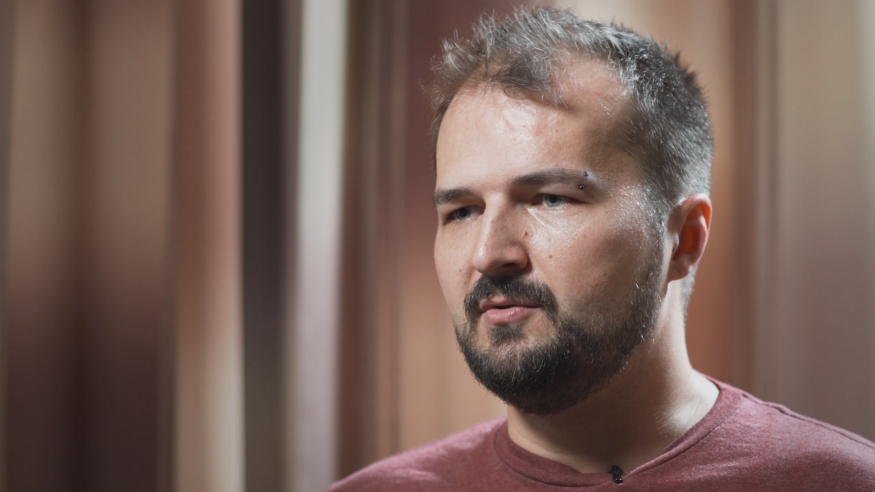
The surprising success of a Croatian picture book for children last year showed that there may be more allies of rainbow families in the country than headlines about burnt effigies and unsuccessful foster care applications might suggest. In the latest Voices of ILGA-Europe video, we meet an activist and father on the frontlines for same-sex family rights in his native country.
In January, a Croatian gay couple who had applied to foster a child were refused for a second time by the Social Welfare Centre in Zagreb, despite a ruling last year by the Administrative Court, giving them the right to foster. “We are a country full of hypocrisy,” Ivo Šegota and Mladen Koži? told Croatian TV news at the time. However, in early February the Constitutional Court issued a separate ruling in favour of same-sex couples fostering. Constitutional decisions must be enforced, and the government is obliged to ensure compliance, so Ivo and Mladen should not be refused by the Social Welfare Centre again.
One of the activists working to secure rights for same-sex couples who already have children, or who wish to form families with children, is Daniel Martinovic of Rainbow Families Croatia (Dugine Obitelji). Daniel spoke to us for the Voices of ILGA-Europe video project at our conference in Prague last October.
“Rainbow Families Croatia work together with LGBTI people with children, and those who want to become parents, and their families,” he explains.
“We do advocacy work to further push for legislation that will be more open and inclusive for family rights of LGBTI people in Croatia, to have access to adoption, to foster care, medically assisted insemination open to everybody, not just heterosexual couples.”
Daniel began working as an LGBTI activist nine years ago, volunteering for the Pride organisation in Zagreb.
“Most of my LGBTI friends were also in some kind of NGOs and I was tired of sitting at home and looking at the situation getting worse,” he says. “I was active in the passing of the civil union law in Croatia in 2014, and right about then a lesbian couple friends of mine wanted to have a child, so I am a donor to them. In doing so we connected with other families, and one of the families started the whole organisation, because we wanted to connect with other rainbow families in Croatia.”
“Currently in Croatia currently, single people can adopt, single people can access foster care, and single women can access medically assisted insemination, but if you’re in a civil union with a person of the same sex, you cannot do so, and that’s clear discrimination.
“And the fact is that our politicians don’t want to make a change because the level of acceptance of LGBTI people in Croatia is still quite low.”
In February an effigy of a kissing gay couple and their child was burnt at a carnival in the Croatian town of Imotski, an action that was condemned by President Zoran Milanovic, government ministers, the Ombudsperson, and LGBTI rights groups including Rainbow Families, which announced that it would file a complaint for “public incitement to hatred and violence” for the “horrifying” act.
Yet, for all the horror of such a hateful act, it seems the picture of support for rainbow families in the country might be a little different. Last year Rainbow Families Croatia published a picture book for children, which turned out to be an unprecedented and surprising success. (You can read the English version of the book, ‘My Rainbow Family’ here.)
“We thought it would be only for us, a couple of families in the organisation,” Daniel explains. “In the end it went to over a 2,000 people in 25 countries. It has really shown us that there are many allies in heterosexual families that want to talk to their children about LGBTI issues.”
The work that ILGA-Europe does with member organisations such as Rainbow Families Croatia is important to Daniel. “The workshops that ILGA-Europe organises throughout the year gives you an opportunity you wouldn’t have, you would be like a small island in your own country. It’s really helped us to become even more visible in a bigger European context, it gives us an easier way to talk to MEP’s in the European Parliament, because it teaches you some skills. It really helps you grow as an organisation, it helps you grow as an individual, so I think it’s really important.”
Activism on the intersections: Being part of the indigenous Sámi community and LGBTI
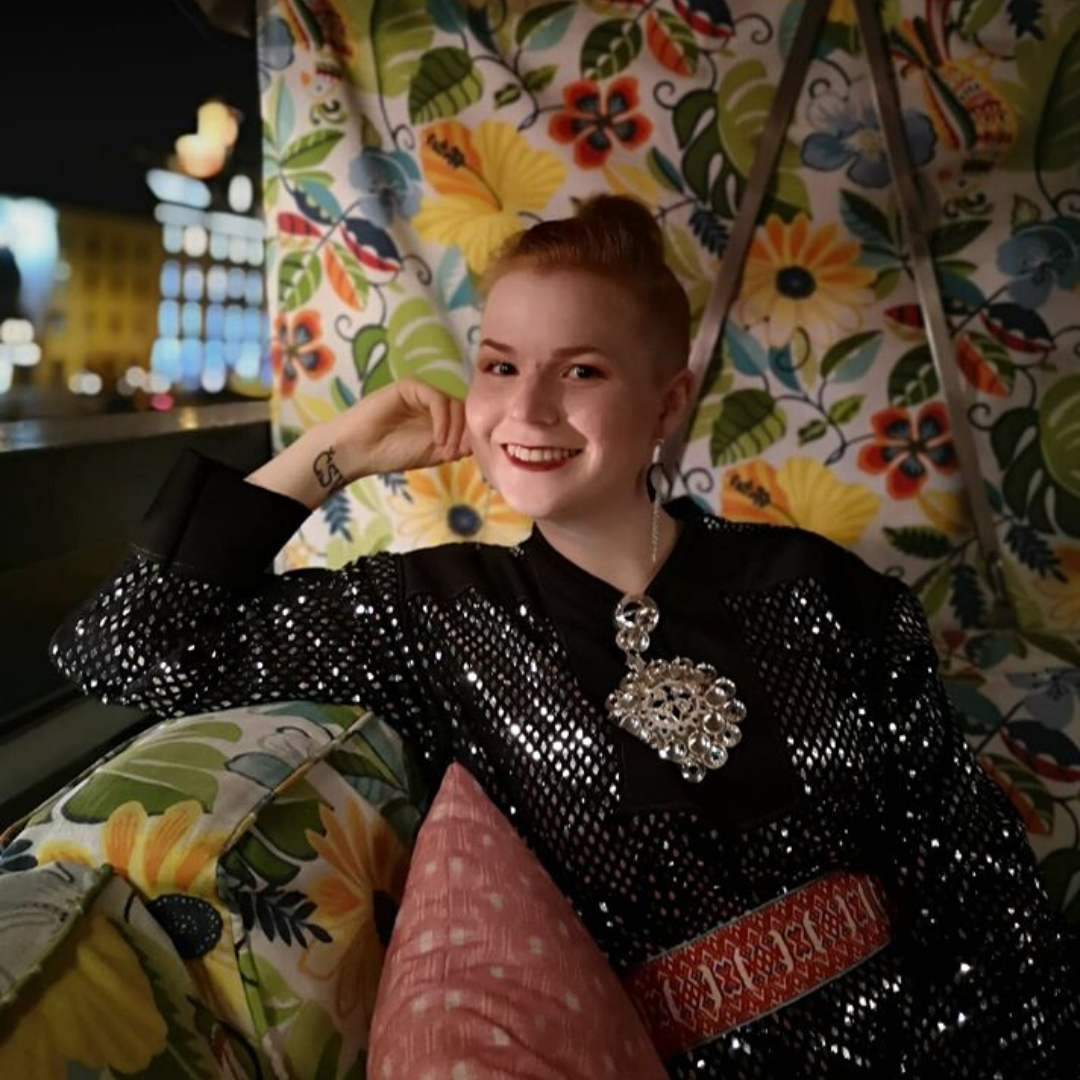
February 6 is Sámi National Day, when indigenous communities from the Sápmi region in Finland, Norway, Sweden and Russia commemorate the first Sámi congress, which was held in 1917. LGBTI Sámi activist, Anne Olli tells us what it means to be at the intersection of two minorities –and what you can do to be a Sámi ally!
LGBTI and Sámi activist Anne Olli, or as she would introduce herself in Sámi language, Ville Ristena Pirkko Anne, is the vice-chair of the Finnish Sámi Youth Organisation (Suomi Sámi Nuorat) and a board member at the Finnish LGBTI rights organization, Seta. Born and raised in Ivalo, in Finnish Sápmi, and living today in Oulu, the 26-year-old activist talks to us for Sami National Day about the double stress of belonging to two minorities, the milestones on her activist journey, and the challenges ahead.
Hei, Anne! Happy Sámi National Day! To start with, could you tell us about how you became an activist?
I think I’ve always been more or less of an activist, be it over environmental questions, indigenous rights or LGBTI rights. But when it comes to LGBTI rights, the story is that after Kautokeino’s Sápmi Pride in 2016 I told the organisers that I’d be willing to help in some way in organising Sápmi Pride to Inari the following year. A few months later I noticed that I was actually the main organiser of Sápmi Pride! So that’s how it started.
Tell us about any milestones on your journey so far, that you are particularly proud of.
Inari’s Sápmi Pride turned out fine, even though there were many problems along the way. Almost 200 people showed up for the parade — that’s a big number for a small village. Later, Seta’s youth committee awarded me with the title of the Rainbow Youth 2018 and I won the category Activist of the Year at Finland’s QX Awards. I was also proud to give a statement about Sámi LGBTI issues at the United Nations Permanent Forum on Indigenous Issues (UNPFII) in April 2019.
What are the biggest challenges that LGBTI Sámi people face?
Loneliness is a big challenge for us, because there aren’t so many of us, and the distances can be very large. We also have to deal with multiple discriminations, where we get discriminated for both our Sámi background and queerness. Belonging to two minorities can bring double stress — as Sámi, there are always threats to our culture and languages, which we need to react to, and at the same time we need to fight homophobia and transphobia and try to lead our normal lives at work or in school, and so on. So, it might not be a surprise that mental illnesses are usual and burnouts happen way too often.
What have been some of the achievements of Sámi LGBTI activists?
Sápmi Pride has been organised every year, since it started in 2014. This is a big achievement, because every year it has been such a big struggle. We activists have also raised the awareness about our existence and issues in Finland, Sweden and Norway. Not everyone knows about the Sámi, even in these countries, and when they hear that there are also LGBTI people among Sámi, they can be really surprised!
How can readers of this blog be good allies to Sámi LGBTI communities?
Educate yourself about Sámi people in general — Say it in Saami is an excellent source for basic information and also a great tool for learning some words and phrases! Follow Sápmi Pride and Sámi LGBTI organization, Garmeres on Facebook and Instagram. If you’re visiting Sápmi, visit Sámi museums and avoid buying cheap ‘Sámi’ stuff at souvenir shops. Be respectful, give space and don’t make assumptions — we are unique individuals with our own stories and experiences just like everyone else. Invite and include us, but do not expect us to be able to do everything for free.
- Miroslawa Makuchowska, Deputy Director at Campaign Against Homophobia, Poland:
loading... - Minister of Internal Affairs and Administration Mariusz Kami?ski, mariusz.kaminski@sejm.pl,